Latest Updates
July 10, 2024 — On Appeal
State Attorneys Make Case to Overturn Youth Climate Decision
The Montana Supreme Court heard oral arguments in the appeal of Held v. Montana on Wednesday
by Micah Drew of the Flathead Beacon
Against a backdrop of smoke from a wildfire burning near Helena, youth plaintiffs, attorneys and climate advocates descended on Montana’s capital city for the appeal of Held v. Montana just over a year after the conclusion of the landmark constitutional climate trial.
The case was decided for the 16 youth plaintiffs by Lewis and Clark District Court Judge Kathy Seeley last August. The ruling invalidated two Montana statutes that prohibited state agencies from considering the effects of greenhouse gas emission and the impacts of climate change during the permitting process for fossil fuel projects, and prohibited courts from revoking or delaying a permit based on inadequate review of climate impacts.
Attorneys for the state of Montana argued three primary points for overturning the decision: that state agencies can’t deny a fossil fuel permit based on analysis done under the Montana Environmental Policy Act (MEPA); even if they could, climate change is a global, complex issue that cannot be resolved by the judicial branch; and the amount of greenhouse gas emissions state agencies can lawfully regulate is not enough to make a global impact and address the harms alleged by the plaintiffs.
“I don’t think they can challenge it based on global climate change,” state attorney Dale Schowengerdt said. “That issue is a complex global issue that can’t be affected by one state’s emissions.”
Kalispell-based attorney Roger Sullivan argued for the plaintiffs, recalling the five days of youth testimony that unfolded during last summer’s trial and citing the “unparalleled trial record.”
“If nothing is done, it will be much harder 50 years from now, when those young players are my age, because of this climate emergency, to which the state of Montana is a substantial contributing factor,” Sullivan said.
State attorneys reiterated arguments made during the seven-day trial before the Lewis and Clark District Court last summer that MEPA is a procedural statute and doesn’t provide an avenue to deny fossil fuel permits due to greenhouse gas emissions. However, Seeley’s ruling states that agencies must either have discretion to deny permits for fossil fuel activities or the permitting statutes themselves must be unconstitutional.
“The reason there is a constitutional injury is because the legislature told the state agencies that they could not look at the impact on Montana’s climate of the fossil fuel activities they permit,” Sullivan said. “And so the agencies haven’t, which is why the record shows that they have never denied a fossil fuel permit.”
A majority of the questions from the bench came from justices Beth Baker and Laurie McKinnon. Baker framed the question on appeal as a narrow one of “whether the legislature complied with the Constitution by foreclosing any review of this issue of greenhouse gasses,” noting that the district court refused to implement any further plan of action.
Justices Jim Rice and James Shea probed Sullivan about the general nature of the case.
“There are no permitting issues, no permitting activities, at issue here,” Rice said. “It seems like what you’re trying to do here is obtain something like a generic judgment.”
“Your Honor, the anticipatory and preventative aspects and dimension of this case could not be more clear,” Sullivan said. Referencing the 1972 Constitutional Convention, Sullivan pointed out that the delegates were clear in their intention to enshrine preventive measures against environmental degradation. “This is the appropriate mechanism to challenge what is going on, impacting these youth plaintiffs and indeed, all young Montanans now and into the future.”
“Montana’s environmental life support system has been degraded, and is threatened with far further degradation through the climate change impacts that caused the plaintiff’s injuries that are directly tied to the greenhouse gas emissions that result from defendants permitting fossil fuel activities,” he continued.
State attorney Mark Stermitz concluded the defense’s argument by reiterating the minimal effect Montana’s greenhouse gas emissions have in a global context.
“The rhetoric that is conveyed as if Montana is the sole source of this problem that we all recognize exists, it has to be reviewed in the context of absolute scientific fact.”
Following the oral arguments, the plaintiffs and their attorneys held a press conference on the lawn of the Supreme Court, with Nate Bellinger, senior attorney for Our Children’s Trust representing the plaintiffs, expressing his confidence that the landmark decision secured last year will be affirmed by the Supreme Court.
Several plaintiffs spoke briefly about the impact this case has had on their lives since it was first filed in 2020, and their own optimism surrounding what’s at stake in the future.
“This is a systemic issue. We’re not addressing this permit by permit because, for one, that’s not feasible, but for two, everything adds up,” said plaintiff Taleah Hernandez, of Polson. “We know that this part of Montana, this beautiful place where we live, is not isolated from the rest of the world … It’s not something that can be handled just one case at a time. It’s got to be a systemic overhaul to ensure our future to ensure that we get the protection that we deserve, and that we get to continue living in this beautiful place and keep it as beautiful as it is.”
August 17 — After the Verdict
‘This Changes Everything’: Experts Respond to Landmark Youth Climate Ruling
Legal, scientific and industry experts agree the ruling in Held v. Montana will have lasting consequences. But will it result in changes to Montana’s energy policies?
By Micah Drew, Flathead Beacon, and Amanda Eggert, Montana Free Press
On Monday morning, when a Montana judge issued a ruling favoring young environmental advocates in the constitutional climate change lawsuit Held v. Montana, Lander Busse, one of the 16 youth plaintiffs, was in a raft on the Flathead River.
When told by his father that the decision favored the plaintiffs, Lander said, “Hell yes, we won, and I am going fishing,” before floating out of cell service, according to his father’s telling of the exchange.
As Busse, 18, drifted out of reach of reporters, the response to the landmark decision rippled across the globe, and in its wake a torrent of analysis has poured in from legal observers, scientific experts, environmental advocates, policymakers and industry stakeholders, all trying to paint a picture of Montana’s future through the legal lens of the verdict, as well as its longterm policy implications.
Held v. Montana made history as the first youth-led constitutional climate change lawsuit to go before a judge, with a seven-day trial unfolding in a Helena district courtroom in June.
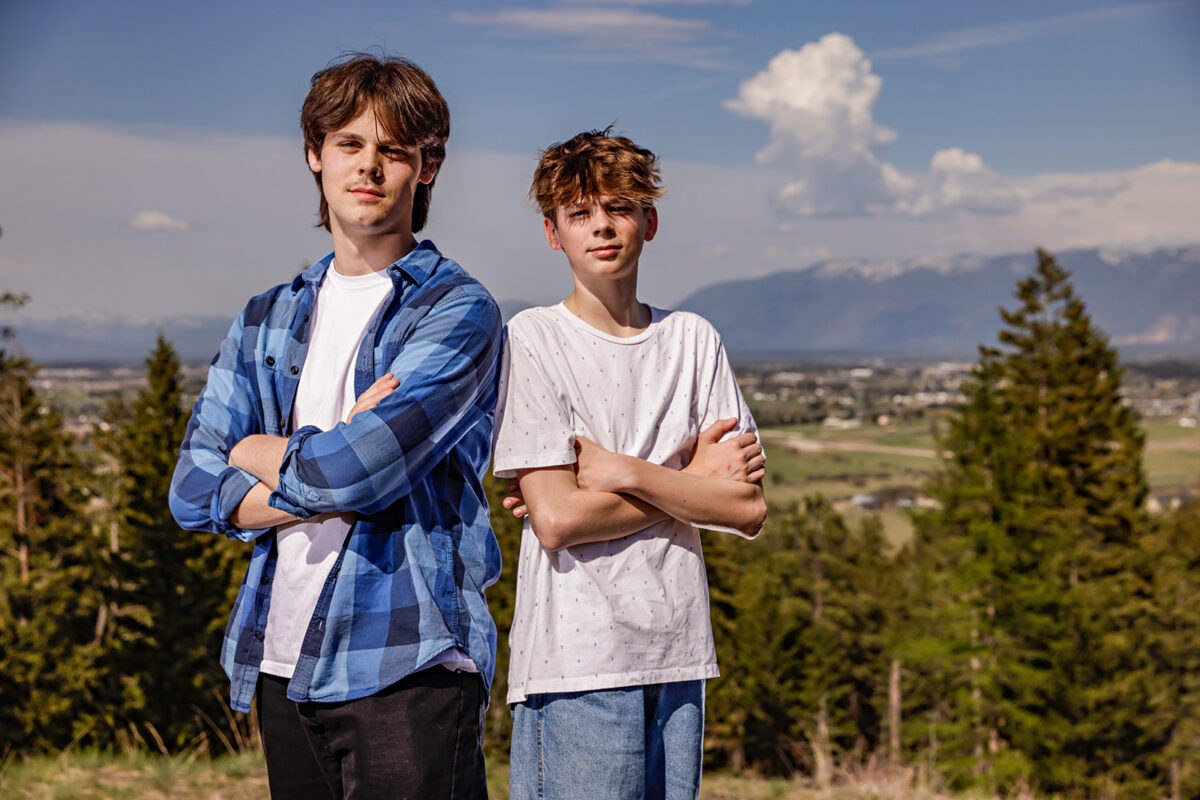
The lawsuit alleged the state had violated the plaintiffs’ constitutional right to a “clean and healthful environment,” focusing on a provision in the Montana Environmental Policy Act (MEPA) that prohibits state agencies from considering greenhouse gas emissions and climate change impacts while conducting environmental reviews.
The ruling by Lewis and Clark District Court Judge Kathy Seeley is the first legal opinion of its kind, spelling out the environmental harms caused by greenhouse gas emissions as well as the effects of climate change on the physical and mental well-being of young people. The ruling also rolled back two Montana statutes, including the MEPA provision.
Michael Gerrard, the founder of Columbia Law School’s Sabin Center for Climate Change Law, said he was “smiling ear to ear” when he read the Aug. 14 decision, which he characterized as the “strongest decision on climate change ever issued by any court.”
“The court resoundingly affirmed what the climate scientists are saying, and it will become ever harder to attack basic climate science in the court, where facts matter,” Gerrard said.
The 103-page Findings of Fact, Conclusions of Law, and Order draws a correlation between greenhouse gas (GHG) emissions and tangible changes to the environment, and it appraises Montana’s contribution to the broader consequences of climate change.
“Montana’s GHG contributions are not de minimis but are nationally and globally significant. Montana’s GHG emissions cause and contribute to climate change and Plaintiffs’ injuries and reduce the opportunity to alleviate Plaintiffs’ injuries,” according to language in the ruling, zeroing in on one of the state’s foundational arguments.
Six states and roughly 150 countries have codified the right to a clean environment in their constitutions, similar to the Montana provision the case was predicated on, and legal experts say the Held ruling may come into play in those jurisdictions.

“There’s a lot of excitement about Montana playing an early role in developing new legal approaches to this problem,” said Michelle Bryan, a University of Montana law professor who specializes in natural resource and environmental law. “All these other cases we see now are potentially going to trial and this decision, and whatever comes out on appeal, will be read by judges all over. Even though they’re not bound by this precedent, they’ll be influenced by what Judge Seeley, and the Montana Supreme Court had to say.”
Emily Flower, a spokeswoman for the Montana Attorney General’s Office, said the state will appeal the ruling. In a statement, Flower characterized the ruling as “absurd,” and called Seeley an “ideological judge who bent over backward to allow the case to move forward and earn herself a spot in their next documentary.”
Speculating about what the Montana Supreme Court might do on appeal, retired Supreme Court Justice Jim Nelson called the case a “slam dunk home run” and said he expects the state’s high court will have a difficult time overturning the decision.
“I think this is one of the most powerful decisions I’ve ever read on the environment in Montana,” said Nelson, who sat on the Supreme Court for nearly two decades.
Nelson said the decision’s biggest implication is the court’s finding that climate change is covered by Article II, Section 3 of the Montana Constitution, the right to a “clean and healthful environment.”
“That’s important. One could think it’s common sense to make that connection, but the court has never said that,” Nelson said. “She also found that the state and legislature have violated their mandatory duties under Article IX, Section 1 to maintain and improve the environment for this and future generations. That’s going to come out in other environmental cases that go before the court.”
Gerrard and Bryan both highlighted the extent to which Seeley’s ruling focused on the source of climate change and the individual harms reported by the plaintiffs — a section spanning roughly 50 pages — and the state’s role in furthering both.
Bryan said future questions will revolve around whether an agency review of greenhouse gas emissions adequately meets the constitutional provision for a clean and healthful environment. “The court’s saying that the climate isn’t an issue you can skip during an environmental review — our constitution requires you to consider it,” she said.
The ruling also suggests that part of an environmental review is considering alternative projects, which in the energy arena could mean considering alternatives to carbon-based fuels.
Bryan said the impetus is now on the state regulatory agencies like the Department of Environmental Quality (DEQ) and the Department of Natural Resources and Conservation (DNRC) tasked with permitting major energy projects to implement changes in Montana.
“The most important part of the ruling is that the government bodies like the DNRC, DEQ and [Montana Department of Transportation] will have to figure out the best way to consider greenhouse gas emissions, which is something other states, and the federal government, are grappling with,” Bryan said. “A lot of work is left to do in terms of figuring out how to implement greenhouse gas reviews into the agency processes.”
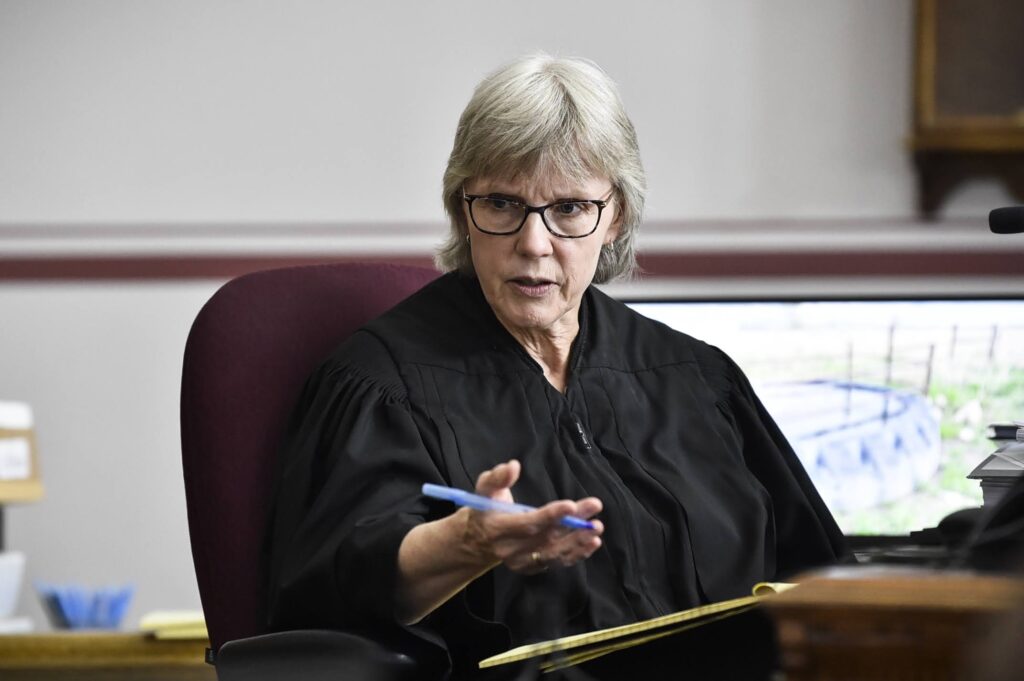
In her verdict, Seeley wrote that it is possible to calculate the amount of carbon dioxide and greenhouse gas emissions that result from fossil fuel extraction, processing, transportation and consumption activities authorized by state agencies. She cited permitting decisions prior to 2011 when agencies quantified and disclosed such emissions. The ruling, however, does not instruct the state on how to quantify emissions, or where the line should be drawn to decline a new permit.
Anne Hedges, co-director of the Montana Environmental Information Center characterized the ruling as both far-reaching and unprecedented, during an Aug. 15 Public Service Commission meeting. Hedges, who served as an expert witness for the plaintiffs and has tracked energy policy in Montana for three decades, said that’s largely due to the implications for the energy permitting process.
“This changes everything,” she said. “The court ruled that the state must be able to deny fossil fuel projects — something the state has never done before.”
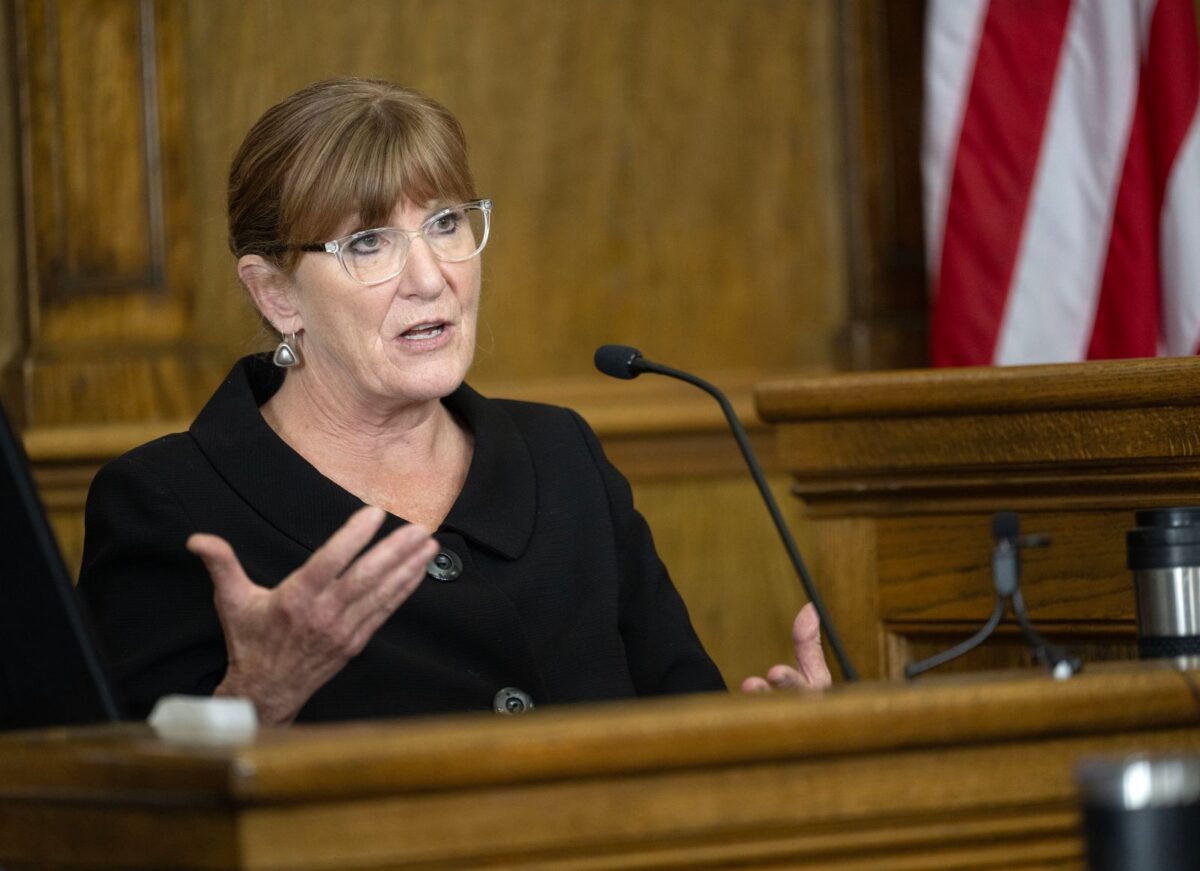
“The state must either have discretion to deny permits for fossil fuel activities when the activities would result in greenhouse gas emissions that cause unconstitutional degradation and depletion of Montana’s environment and natural resources, or the permitting statutes themselves must be unconstitutional,” Hedges said, pulling language directly from the ruling.
In addition to finding that cataloging greenhouse gas emissions is technically feasible, Seeley wrote that a transition to renewable energy is ”economically feasible and technologically available to employ in Montana.” She added that there is a roadmap for a transition to such energy sources available that will “create jobs, reduce air pollution, and save lives and costs associated with air pollution” in addition to garnering climate benefits.
During the trial, Stanford University Atmosphere/Energy Director Mark Jacobson said Montana has “incredible” renewable energy potential, particularly in regard to wind generation. Jacobson said his modeling demonstrates that the state could easily meet its energy needs and keep the grid stable by pairing existing hydropower generation with expanded wind and solar power, backed up with battery storage.
Seeley also cited Jacobson’s calculation that wind and solar cost about half what a new natural gas project does, and are “even cheaper compared to coal” in her order.
Entities representing or heavily invested in the fossil fuel industry expressed dismay with the decision and emphasized the unknowns it raises, while Montana-based renewable energy advocates said it will accelerate a transition that’s already underway.
Montana Petroleum Association Executive Director Alan Olson said the ruling amounts to job security for lawyers and will prove difficult to implement given the technical challenges associated with emissions accounting. Olson also said he fears an abrupt transition to renewables would be expensive for ratepayers when electricity demand surges and shrink the tax and philanthropic footprints of companies like Signal Peak Energy, which owns a coal mine in Musselshell County that employs about 280 people.
Olson added that whatever the regulatory shifts are, they won’t happen overnight. “It’s going to be a long process to conform with this,” Olson said. “You’re going to need statutory changes, you’re going to need rule changes.”
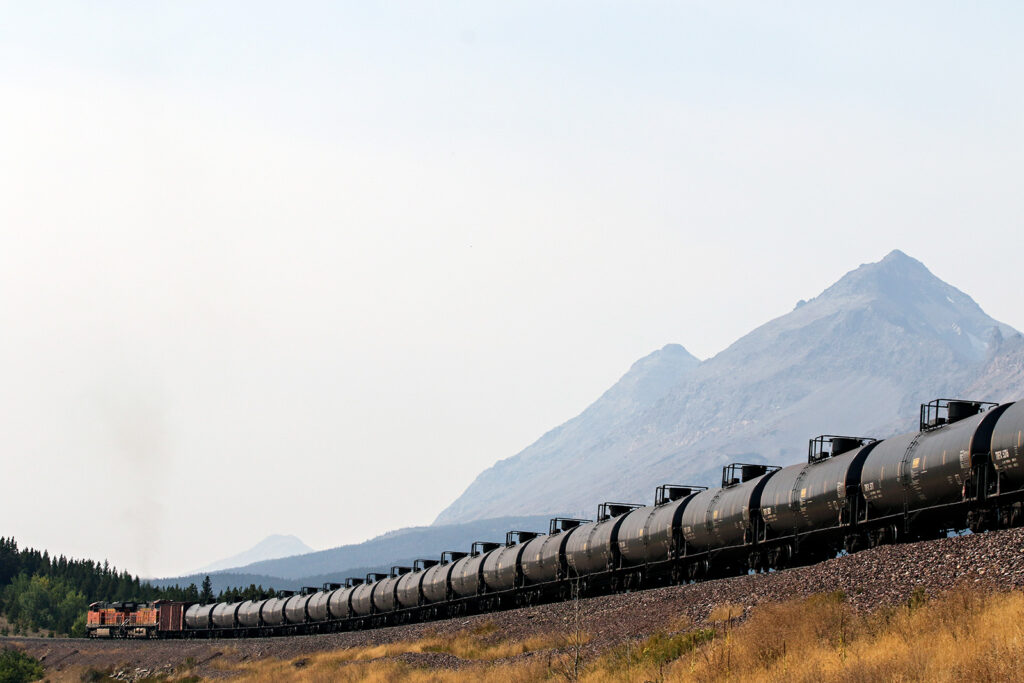
Steve Fitzpatrick, a Republican lawmaker from Great Falls who urged his colleagues in the Legislature to pass Senate Bill 971, a measure barring the state from considering greenhouse gas impacts in environmental reviews that Seeley struck down in her ruling, echoed that sentiment. Between the State’s appeal and the Legislature’s input in future legislative sessions, “it’s too early to say what kind of impact this case is going to have,” he said.
“In my opinion, all [Seeley] has really done is given the Legislature an invitation to come in and redraft MEPA with respect to greenhouse gas impact or out-of-state impacts,” he said, adding that Seeley’s order gave the plaintiffs “20%” of what they wanted in his estimation.
A requirement to analyze greenhouse gas emissions might make that process “longer and more cumbersome and more expensive,” but it doesn’t amount to a wholesale prohibition on new coal mines or gas plants, he argued.
Makenna Sellers, executive director for the Montana Renewable Energy Association, said in an email that the Held ruling could make carbon-free projects more attractive in Montana and described her industry’s contribution as “part and parcel to Montanans’ constitutional right to a clean and healthful environment.”
Bruce Spencer, who lobbies on behalf of large wind and solar developers for the Montana Energy Business Alliance said he anticipates clean energy will continue expanding in Montana so long as the regulatory climate remains stable for would-be investors.
“MEBA is just hopeful that Montana’s business conditions will continue to permit renewable energy development as part of Montana’s energy portfolio,” he added.

Despite vast coal reserves — more than any other state in the country — the state is trending more and more toward renewables, according to a 2023 report released by DEQ. “Development of new in-state generation is being led by wind resources, natural gas, solar assets, and increasingly, large-scale batteries.” The agency’s analysis found that wind-generated capacity has doubled in the past decade and is close to equaling coal-fired capacity in the state.
Bryan, the University of Montana law professor, noted the irony that the landmark decision was handed down at a time when Montana is facing multiple wildfire outbreaks, extreme heat, record low streamflows and drought conditions, all environmental impacts that scientists tied to climate change during the trial.
“It just underscores the problem that stimulated the trial: we’re going in the wrong direction,” said Jack Stanford, the former director of the Flathead Lake Biological Station, who served as an expert witness for the plaintiffs. “Everyone who depends on water and Montana’s rivers is going to feel the effects of this climate warming and the loss of flow and volume in our streams and rivers.”
“I think we’re just pleased that the trial went our way and hope that Montana’s government steps up to the plate and takes a few swings in favor of the environment instead of fossil fuel development,” Stanford said.
June 20 — Trial Day 7, Final Recap
With Landmark Climate Trial Over, Youth Plaintiffs Describe it as ‘Just the Beginning’
Counsel for both sides offered short closing remarks Tuesday on the bench trial’s final day, with the judge’s order expected within weeks
By Micah Drew, Flathead Beacon
HELENA — On the final day of a groundbreaking constitutional climate trial that activists hope will establish solid legal precedent and incite systemic change to Montana’s standard of approving fossil fuel projects, an 18-year-old plaintiff from Kalispell characterized the end of the lengthy legal proceedings as “just the beginning.”
“We’re hopefully starting a trickle down of other litigation and activism nationally,” Lander Busse, who was raised in Kalispell along with his brother, a co-plaintiff in the case, said at a press conference following Tuesday’s closing statements in Helena. “We hope we made a spark here.”
Attorneys representing the 16 young plaintiffs in Held v. Montana, as well as counsel for the state, delivered their brief closing remarks before Lewis and Clark District Court Judge Kathy Seeley on the seventh and final day of a non-jury bench trial that was scheduled to run through the end of the week. The trial wrapped up early after the state called on fewer expert witnesses than its legal team anticipated, instead laying out the entirety of its defense in less than a day, despite having mounted an aggressive defense in pre-trial proceedings that spanned three years.

Counsel for both sides now must prepare and submit their written findings of fact and conclusions of law, which are required in non-jury legal actions of this kind. Filings are expected within two weeks, after which Seeley will respond with her final order.
Regardless of who prevails, the ruling is expected to be appealed to the Montana Supreme Court as the until-now untested legal strategy became the first constitutional climate case litigated before a judge. The case marks just the second time a court has heard arguments about state actions on climate change; as such, its reach will be determined in the appeals process.
Since it opened on June 12, much of the landmark environmental trial has centered on the connection between Montana’s warming climate and the harm alleged by the plaintiffs, who say their constitutional right to a “clean and healthful environment” has been violated by the state’s practice of promoting and permitting the fossil fuel industry, contributing to climate change through greenhouse gas emissions.
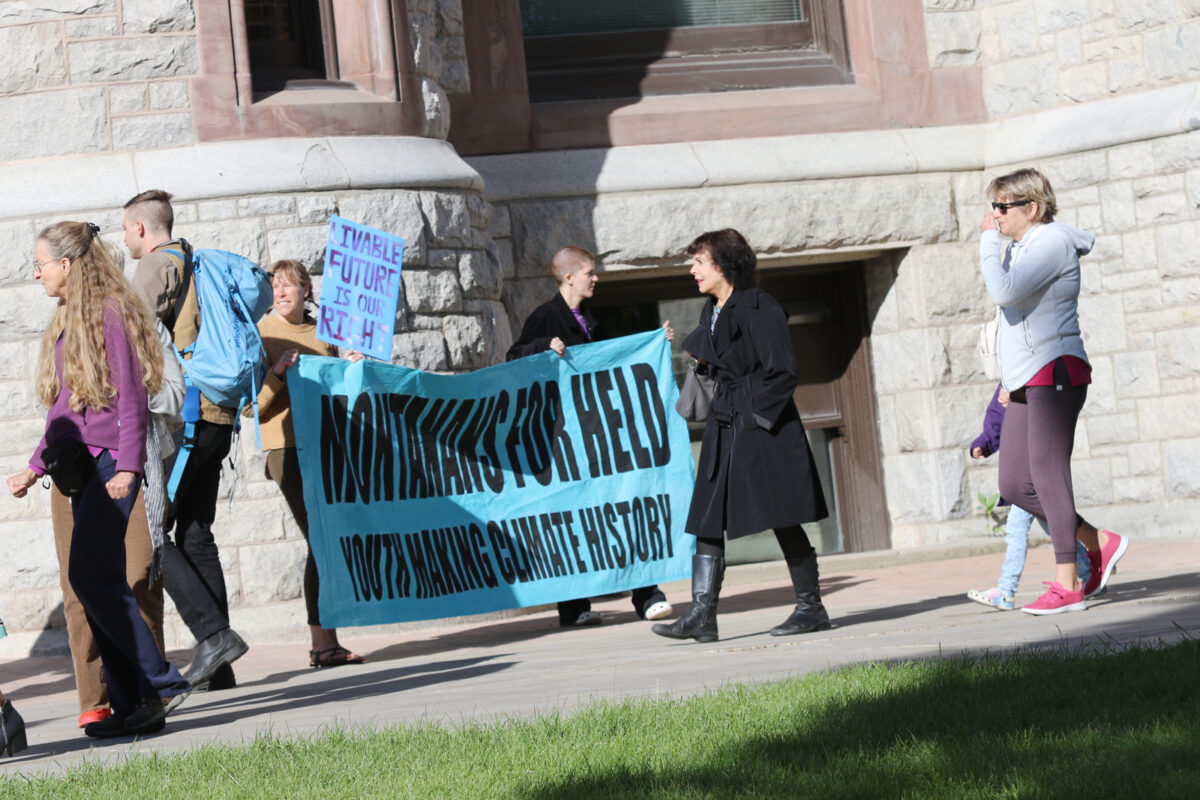
The state, meanwhile, disputed the evidence that burning fossil fuels contributes to climate change in a meaningful way, and denied that Montana’s increasingly severe wildland fire seasons and drought are linked to its legacy of supporting fossil-fuel burning projects reliant on coal, oil and gas.
During the trial’s first week, attorneys for the young plaintiffs presented testimony from expert witnesses, including leading climate scientists, glaciologists, policy experts and mental health professionals, to describe the alleged harms the plaintiffs have suffered because of Montana’s promotion and permitting of the fossil fuel industry. Ten of the youth, ranging from ages 14 to 22, also took the stand to describe how their quality of life has been compromised by both the real-time effects of climate change as well as its haunting specter.
Nate Bellinger, an attorney with Our Children’s Trust representing the plaintiffs, summarized the expert testimony and science presented to the court as a solution-oriented narrative that provides a clear road map for the state to redress the youths’ complaints.
“Solutions to the climate crisis are available now. And the only thing standing in the way are government laws that perpetuate Montana’s fossil fuel-based energy system,” Bellinger said. “These 16 young people shouldered the responsibilities to come here and share their intimate stories of harm … they ask that the state alleviate the harms of its own conduct.”
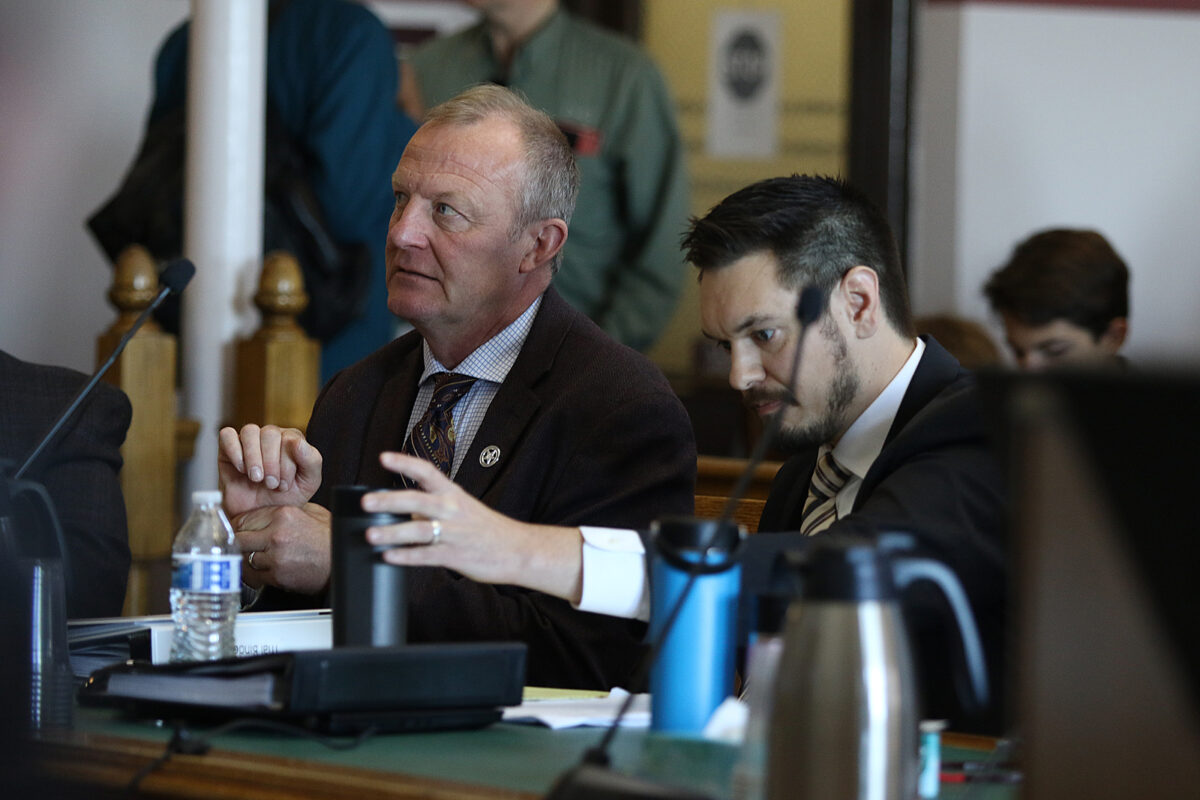
After the state succeeded in narrowing the scope of the lawsuit during pre-trial motions, the case centered on a single provision in the Montana Environmental Policy Act (MEPA), a piece of legislation that directs state regulatory agencies to conduct an environmental review of major state actions, such as permitting fossil fuel projects. A 2011 version of the law barred agencies from considering any impacts that are “regional, national or global” in scale, while a 2023 revision directly prohibits any evaluation of greenhouse gas emissions or climate change impacts within or outside the state.
On Monday, the state called two employees of the Department of Environmental Quality (DEQ) to testify that MEPA is merely a procedural playbook and doesn’t offer state agencies authority to regulate actions based on potential emissions or climate impacts. Referencing those remarks, Bellinger said if the state’s own regulatory agencies lack the discretion to deny or condition a permit even after an environmental review reveals harms that “arise to the level of constitutional violations,” the underlying permitting statutes themselves are unconstitutional.
In closing, Bellinger said the right to a clean and healthful environment is the latest in a long line of basic human rights — including women’s rights, segregation, public schooling, marriage — that required judicial intervention.
“Time and again the political will of powerful majorities was struck down by the courts based on compelling evidence, courageously correcting the injustices thrust on people,” he said. “Plaintiffs are asking this court to declare that a stable climate system is fundamental to the protection of their rights to a clean and healthful environment.”
For the state, Assistant Attorney General Michael Russell offered the trial’s final remarks, homing in on what should be a narrow interpretation of a single law passed by the Legislature.
“The people of Montana are most represented by their elected representatives … here the people of Montana, through the Legislature, enacted the MEPA and its operations, including the provision at issue in this case,” he said. “State agencies can’t implement laws that haven’t been enacted by the Legislature,” including considering climate change during the permitting and review processes.
The entirety of the state’s defense spanned less than one full day of trial, compared to the five days during which plaintiffs’ attorneys called on witnesses. The defense called just one expert witness, an economist, whose testimony Seeley said “raised some questions” about its validity.

But Russell kept his focus trained exclusively on the legal boundaries of the case, adding that any lawsuit alleging harm must prove the harm was caused by the defendant.
“That’s true whether the case is a car wreck, a crime or the constitution of Montana,” he said. The expert witnesses and scientists “did their best to avoid talking about the causal link between the Legislature’s directive under MEPA to the measurable impacts on the ground.”
The court system is not the place to air grievances over the environment, he added, and encouraged the plaintiffs to seek a different avenue for their legal remedy, such as ballot initiatives, lobbying their legislators or continuing to advocate in the public sphere.
“Democracy is the appropriate process for change,” Russell said.
“This case has received national attention in part because it’s been billed as a referendum on climate change generally,” he continued. “This is not supposed to be a town hall meeting or popularity contest.”
June 19 — Trial Day 6 Recap
State Employees, Economist Testify for State as Climate Trial Winds Down
The state called just one expert witness on the penultimate day of the Held v. Montana trial; closing remarks were scheduled for Tuesday morning
By Micah Drew, Flathead Beacon
HELENA — Attorneys representing the state of Montana in a constitutional climate lawsuit presented testimony on Monday from two state employees who sought to clarify that the Montana Environmental Policy Act at the heart of the case offers no option for state agencies to regulate greenhouse gas emissions or the impacts of climate change — even if the state loses the lawsuit.
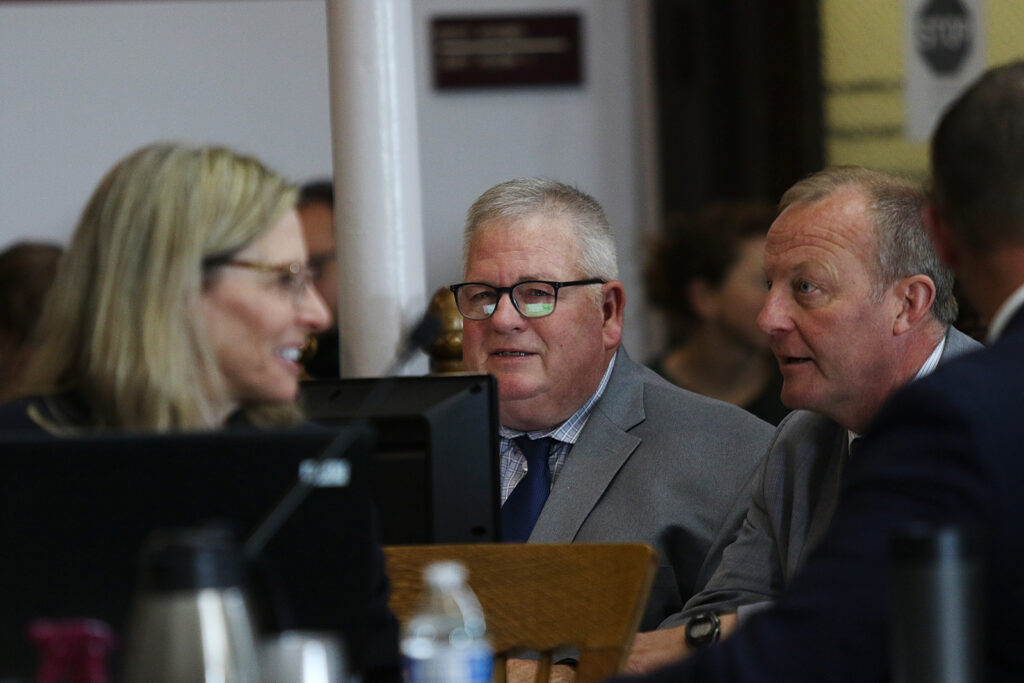
The mission of the Department of Environmental Quality (DEQ) is to “champion a healthy environment for a thriving Montana,” but director Chris Dorrington told the Helena courtroom that the regulatory agency is bound by the laws passed by the Legislature.
“We implement the laws of the state regarding environmental protection,” he said. “We’re not the ones who create the laws.”
Dorrington testified before Lewis and Clark County District Court Judge Kathy Seeley on the sixth day of the Held v. Montana trial, the first time a constitutional climate suit has gone before a judge. Through the lawsuit, 16 youth plaintiffs are seeking to hold the Montana government accountable for its fossil-fuel permitting policies, alleging their right to a “clean and healthful environment” has been violated
At the center of the case is the Montana Environmental Policy Act (MEPA), which established a process for the state to anticipate and prevent “unexamined, unintended, and unwanted consequences,” according to the MEPA handbook, with a provision that major government actions undergo an environmental impact review. In 2011, the Legislature amended MEPA to state that environmental reviews could not consider impacts that are “regional, national or global” in scope — which attorneys for the plaintiffs called the “MEPA limitation” and the “climate change exception” in the initial complaint.
In May, the Legislature amended that provision of MEPA to specifically ban state agencies from considering greenhouse gas emission or climate change impacts within or outside of the state boundaries. Attorneys for the state sought to throw out the Held case based on this rewording of the statute, but in a court order Judge Seeley stated it wasn’t a substantive enough change to disregard the suit.
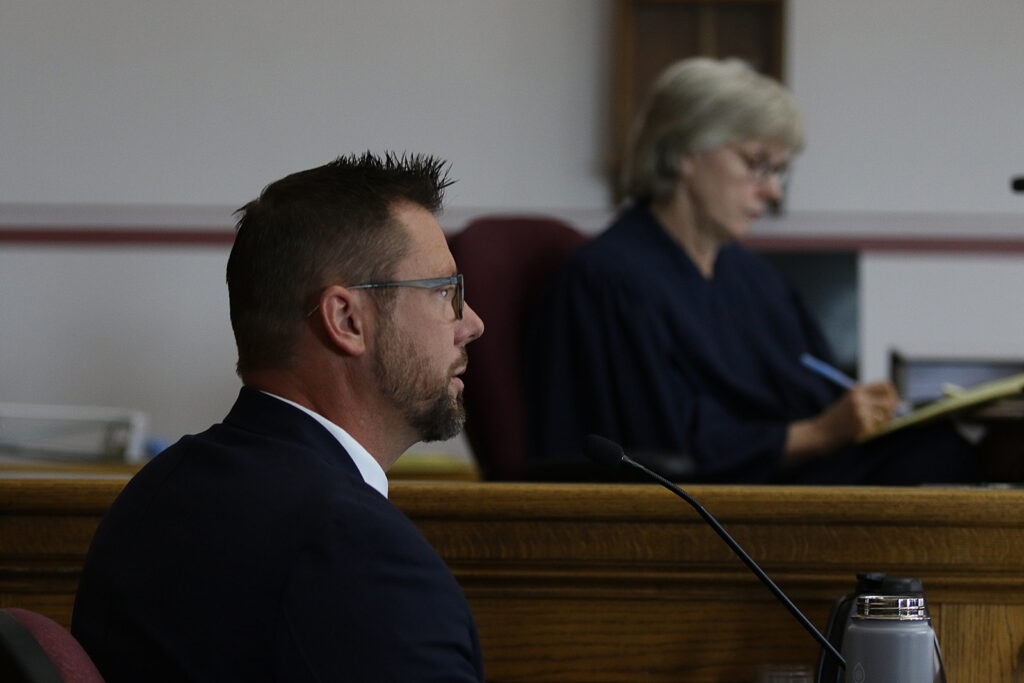
Dorrington, along with Sonja Nowakowski, DEQ’s Air, Energy and Mining Division Administrator, both told the court that MEPA is a procedural statute only and does not provide any authority for the department to make decisions based on potential impacts to the climate.
The department is unable to deny a fossil fuel permit, such as for a coal mine expansion, if the application fully complies with existing law, Dorrington said, and even if Judge Seeley ruled against the state, DEQ would still have no authority to stop permitting coal mining or natural gas operations in the state.
“We will permit what is submitted to us and fully complies with the law,” Dorrington said.
During cross examination, Dorrington contradicted his deposition by saying he did not think the greenhouse gas emissions resulting from DEQ permits have had an effect on the state’s healthful environment.
In addition to serving as a DEQ Division Administrator, Nowakowski has a “unique understanding” of environmental policy, having spent years working as a nonpartisan research analyst in the legislative environmental office, which included working on several statewide climate action plans.
During her testimony, she pushed back against insinuations that the department “rubber stamps” fossil fuel permits.
“There isn’t a single person who works at DEQ who doesn’t care deeply about the environment and care deeply about the laws. They’re charged with implementing and enforcing,” she said. “These people thrive on poking holes in applications and making sure that they meet the letter of the law in terms of regulation.”
However, during her cross examination, Nowakowski was repeatedly asked whether DEQ could ever deny a permit of any kind based on greenhouse gas emissions or climate change impacts. She repeatedly stated that under the state permitting regulations — including the Clean Air Act, the Clean Water Act and the Strip and Underground Mine Reclamation Act — DEQ did not have that authority.
She also mentioned that prior to the 2023 MEPA amendment prohibiting a review of greenhouse gas emissions, the word “greenhouse” only appeared in Montana Code Annotated four times — twice for regulation of actual greenhouses and twice for tax abatements for programs promoting renewable energy or limiting greenhouse gases — and that the agency can’t consider something that doesn’t appear in the law.
Attorneys for the plaintiffs returned to several exhibits displayed last week during testimony from Anne Hedges, the co-director of the Montana Environmental Information Center. Those exhibits show that prior to 2011, DEQ routinely conducted analyses of carbon dioxide emissions, establishing that there was a method in place to consider those impacts. Both Dorrington and Nowakowski agreed that such analyses are possible.
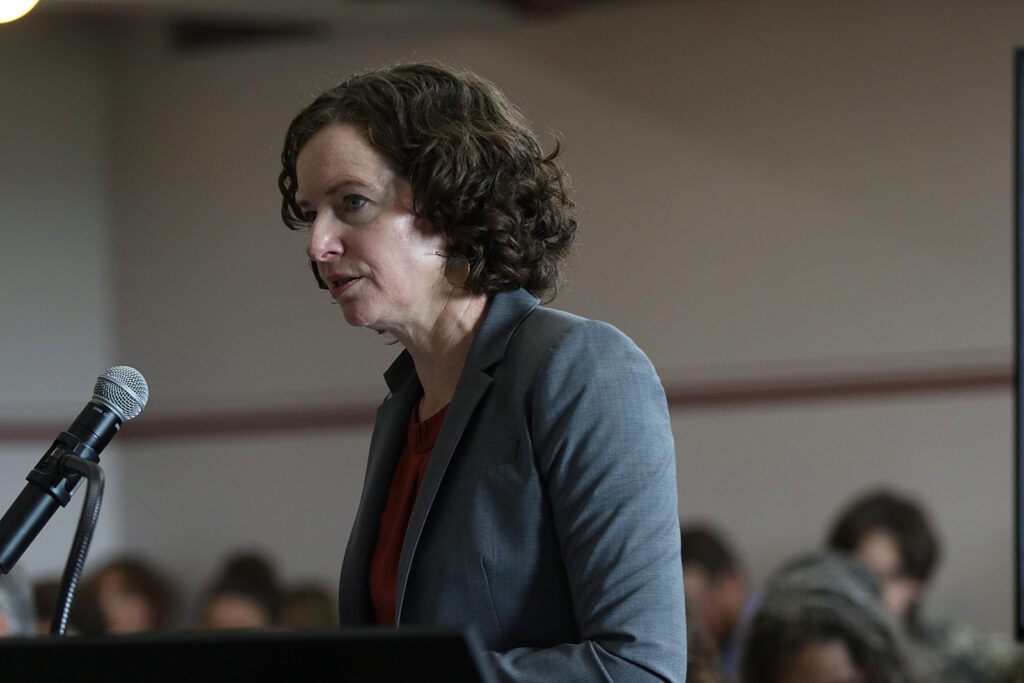
While the state lined up several expert witnesses during pre-trial preparation, including having them submit expert reports and depositions, they only called one to the stand, Dr. Terry Anderson.
Controversial climatologist Judith Curry, who watched trial proceedings via Zoom last week and has charged the state of Montana more than $30,000 for her work preparing for the case, according to DeSmog, is no longer testifying. Neither is Dr. Debra Sheppard, a neuropsychologist who during her deposition admitted to not having expertise in how climate change affects children’s mental health.
Instead, the only expert called by state attorneys was Anderson, an economist and senior fellow at the Hoover Institute.
Attorney Thane Johnson took a narrow line of questioning in his direct examination, asking Anderson about the total amount of greenhouse gas emissions from Montana, compared to the global total.
Anderson stated Montana’s 2020 emissions were 0.262 gigatons, just 7/100ths of a percent of the global 34.8 gigatons.
Plaintiffs’ attorney Phil Gregory immediately pushed back on Anderson’s credentials during cross examination, citing numerous errors in Anderson’s expert report, his inability to recall where he pulled the state’s greenhouse gas emissions statistics from, and whether an economist could accurately be considered an expert on greenhouse gas emissions. He also pressed Anderson on his $500 per hour rate to provide expert testimony, a task to which Anderson said he’d devoted at least 25 hours. By contrast, the experts for the plaintiffs all stated they were appearing without compensation.
Gregory was unsuccessful in his attempts to strike Anderson’s testimony from the record, although Seeley admitted it “raised some questions.”
The trial was expected to last for a full two weeks, but counsel for both sides told Seeley they are prepared to rest their cases and deliver closing remarks — not to exceed 10 minutes — on Tuesday morning.
Following the day’s proceedings, attorneys with Our Children’s Trust, one of the firms representing the plaintiffs, told reporters that with the “irrefutable evidence” provided to the court, they expect to win the case.
June 16 — Trial Day 5 Recap
Expert Cites Montana’s ‘Incredible’ Renewable Energy Potential, Teenage Plaintiffs Mourn Inaction as Climate Trial Hits Halfway Point
Friday marked plaintiffs’ final opportunity to present witnesses in youth-led lawsuit Held v. Montana
By Amanda Eggert, Montana Free Press
HELENA – Plaintiffs in a first-of-its kind youth climate lawsuit sought to illustrate both the feasibility of transitioning Montana to fossil fuel-free energy sources and the physical, emotional and societal dangers of a “business as usual” approach to climate policy in the fifth day of the Held v. Montana bench trial.
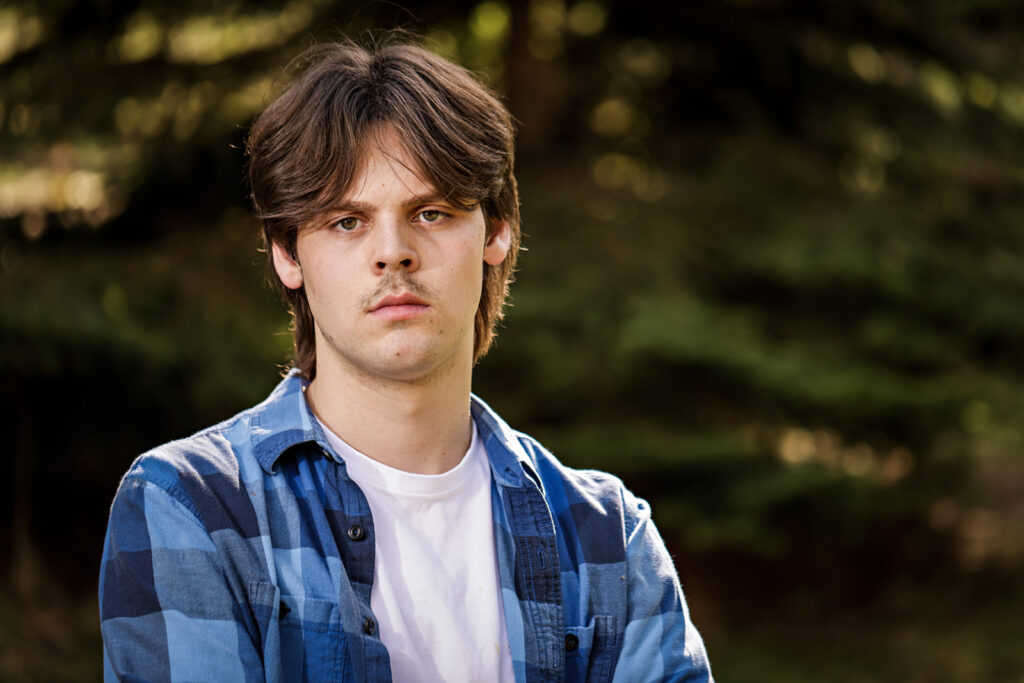
Friday was the plaintiffs’ final opportunity to present expert witness testimony before the state will summon its witnesses to foreground its arguments. Lewis and Clark County District Court Judge Kathy Seeley also heard from two of the youth plaintiffs, Olivia Vesovich and Lander Busse. Like their 14 co-plaintiffs, Vesovich and Busse allege that the state is violating their constitutional right to a “clean and healthful environment” by promoting fossil fuel energy sources.
Mark Jacobson, director of Stanford University’s Atmosphere/Energy Program, pulled upon his expertise in civil engineering, environmental engineering and atmospheric science to lay out a roadmap that would decarbonize the state’s energy grid by 2050 — though the ideal timeline would be closer to 2035, according to the report. The plan calls for building out more wind, solar and battery projects and using existing hydropower generation to meet the state’s energy needs.
Drawing from an analysis he completed in 2022, Jacobson argued that Montana has more than enough renewable energy — wind in particular — to provide for its energy needs. He said only Alaska and Texas have a stronger wind energy resource than Montana.
Jacobson also argued that making that transition would result in cheaper, less polluting energy sources for Montana. By using available storage technology and grid interconnections with other renewable generation in places such as Washington, Idaho and Canada, “it’s very easy to keep the grid stable in Montana,” he said.
“Montana has so much renewable energy potential, it’s incredible,” Jacobson continued, arguing that the only reasons Montana hasn’t adopted a fully renewable portfolio is a lack of policies to promote clean energy and a legacy of investment in fossil fuel infrastructure.
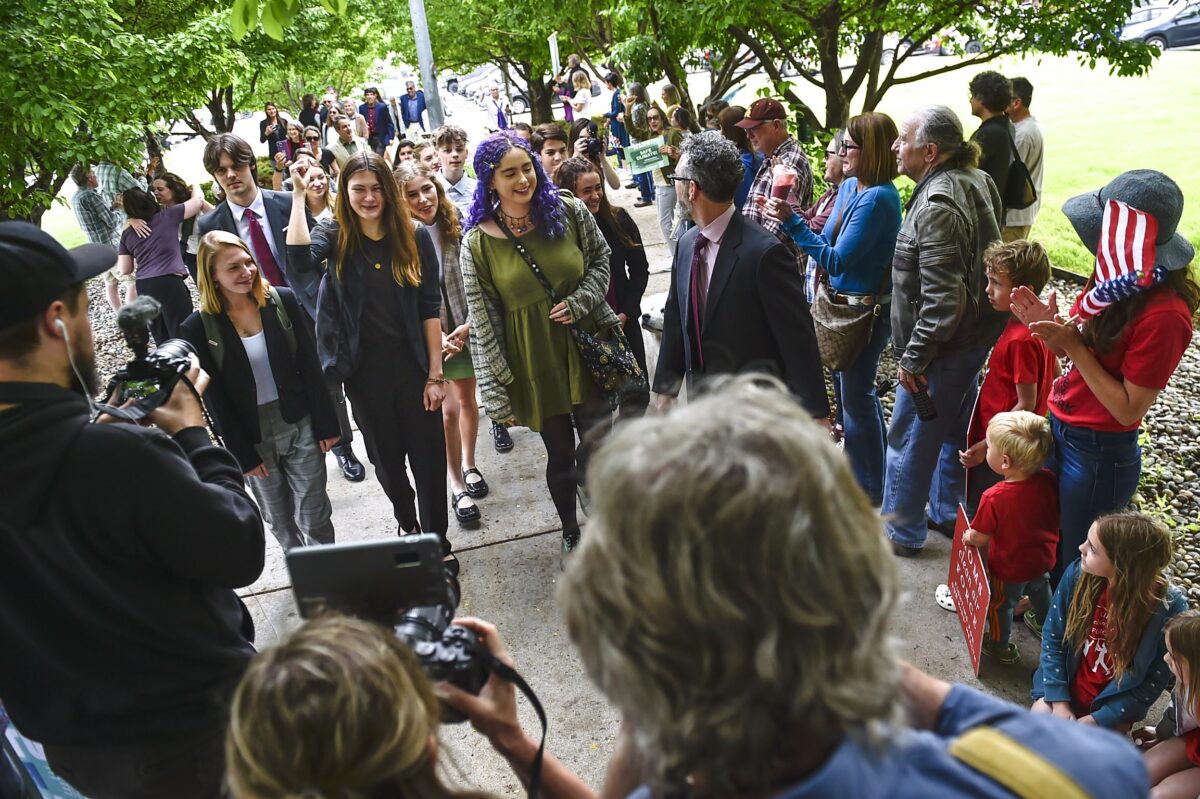
Jacobson also asserted that, given the increasingly competitive prices for solar and wind generation, a transition to carbon-free energy will be cheaper for energy consumers than the coal and gas-fired power that’s currently favored by state policymakers.
“About 10.5% of all energy in Montana is used just to mine, transport and refine fossil fuels,” he added. “We don’t need to do that when we have clean renewable energy like wind, water and solar. Wind comes right to the [turbine]; solar comes right to the rooftop.”
Jacobson’s testimony also highlighted a handful of emissions-free technologies gaining a foothold in consumer markets such as heat pumps, induction stoves and electric vehicles. Such technologies are more efficient than their fossil fuel counterparts, he argued.
During cross-examination Mark Stermtiz, an attorney for the state, suggested that switching to an electric vehicle might be cost-prohibitive for some Montanans, or run counter to their personal preferences.
Jacobson countered that the lifetime of your typical car is 15 years and he’s calling for a phased, not immediate, transition to EVs. If consumers transition to EVs, he said, they’ll save money over the long-term as production ramps up and an economy-of-scale dynamic takes hold. EV drivers save a considerable amount of money if a comparison is made between the electricity charging costs and the cost of filling a vehicle’s tank with gasoline, he added.
Like another expert witness for the plaintiffs, pediatrician Lori Byron, Jacobson also touched upon the public health impacts associated with fossil fuel emissions. He said that projecting forward to 2050 in a “business as usual” scenario, there are estimated to be about 130 premature deaths in Montana due to fossil fuel- and biofuel-related air pollution.
Following Jacobson’s testimony, the plaintiffs’ attorneys called Vesovich to the stand, a 20-year-old college student from Missoula. Vesovich described for the court the impact of climate change on her physical health and the anxiety and sadness she wrestles with as a result of her experience of climate change.
When she was in seventh grade, Vesovich was prescribed an inhaler for exercise-induced asthma. She said her asthma isn’t just exercised-induced anymore, though. On particularly smoky days — which the Missoula Valley experiences frequently in the summer — she said she feels as if she’s suffocating if she’s outside for too long. Her limit is about 30 minutes before she has the panic-inducing experience of being unable to breathe, she said.
Vesovich, an art student and aspiring teacher, also spoke about what she described as the “greatest sadness of her life” — her recognition that she may not be a mother because she fears conditions will only worsen in the future.
“My family is one of the most important parts of my life. Knowing that I may not start a family of my own — it breaks my heart, it really does,” she said.
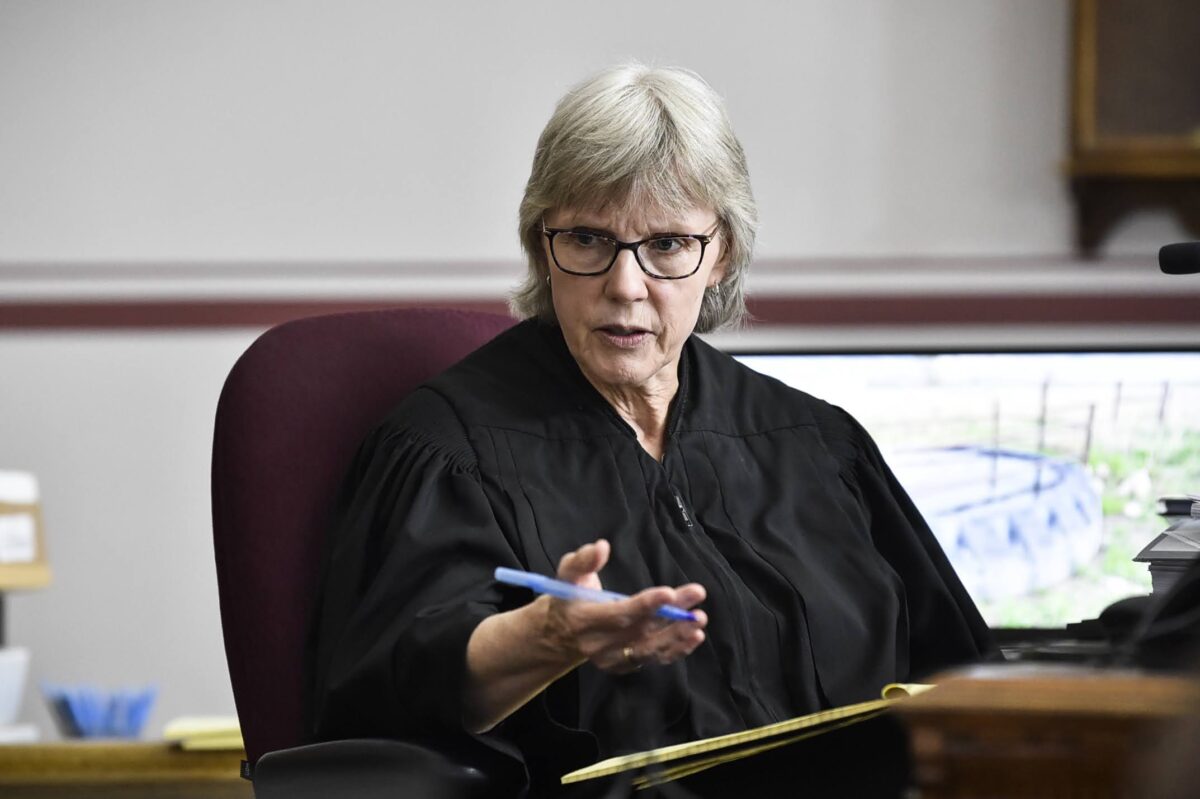
When asked what she’s seeking from the court, Vesovich drew in a shaky breath, turned to look at Seeley and said, “I”m asking the state to uphold our constitutional right to a clean and healthful environment.” She’s also asking, she said, that the court seriously consider the testimony of her co-plaintiffs and the expert witnesses who’ve testified over the course of the week.
Keeping consistent with its strategy, the state’s attorneys did not cross-examine Vesovich, nor Busse, whose testimony closed the day’s proceedings.
Children born today are projected to experience seven times the extreme weather events compared to adults, according to the plaintiffs’ next witness, Lise Von Susteren, a psychiatrist who has authored books on climate and mental health. Living with the uncertainty presented by such disruption exacts a mental toll that manifests in both post-traumatic responses and what Van Susteren has dubbed pre-traumatic stress, or the “inchoate sense that in the future bad things are going to happen.”
Reading material from a 2017 report appearing in the American Psychological Association, Van Susteren asserted that “climate impacts may have long-term and even permanent effects, such as changing the developmental potential and trajectory of a child.” She also read material from the Intergovernmental Panel on Climate Change Sixth Assessment Report asserting that children are particularly vulnerable to climate change impacts, which may have long-lasting effects and influence their adult functioning.
Part of what makes climate change so harmful for children is the likelihood they’ll experience recurrent periods of distress and loss, said Van Susteren, who co-founded the Climate Psychiatry Alliance.
“When the exposure to those events are repeated … that’s where you find the most stress and the most physical and psychological harm,” she said.
Van Susteren then outlined the myriad ways the alignment of these situations can manifest. Hotter temperatures have been correlated with an increase in violence at the individual and group level, she said, and researchers have established a relationship between suicide and drought by examining how the two have risen together among farmers in India and ranchers in western Australia.
“There’s something peculiar associated [with] drought, and that is the despair that comes from looking up at the sky day after day and not seeing any of those rains — and knowing that, day by day, the consequences are going to get worse,” she said.

Earlier in the week, earth scientist Cathy Whitlock and lead author of the 2017 Montana Climate Assessment explained how climate change is appearing in Montana, including hotter, drier summer months, lower summer streamflows and more frequent droughts.
Lander Busse, an 18-year-old Kalispell resident who recently graduated from high school, described his family’s love for outdoor activities such as hunting and fishing during his testimony. Those activities are less available to his family as streamflows shift and increasing wildfire smoke changes hunters’ windows for pursuing big game, he said. Pervasive smoke generates in him a “weird post-apocalyptic feeling,” he said, adding that he’s started to refer to wildfire season as Montana’s “fifth season.”
Busse said his feelings about climate change are magnified by his love for Montana and his frustration that policymakers have failed to implement solutions that are within reach.
“We could be having a much different conversation [with] Montana as a leader,” he said. “I don’t know how you can sit in this courtroom and listen to everything that is put on display and not have a semblance of regret, or even responsibility, to get up and fix these things that we have been told, firsthand, can be fixed.”
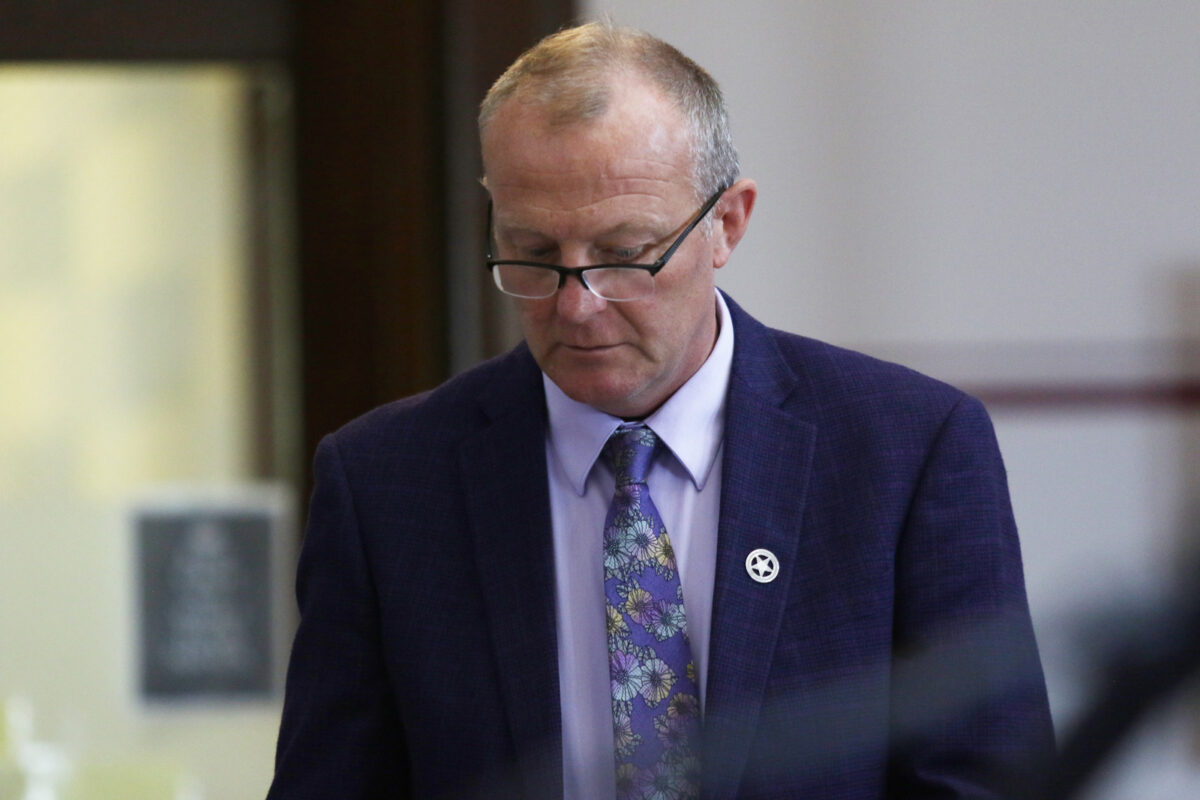
Starting Monday, the defense will have an opportunity to call its witnesses to the stand to more fully establish its legal position. The state is expected to argue that Montana’s contribution to global emissions is small in the global scheme and that there are no legal remedies available to the plaintiffs that could bring emissions down to levels that would correct the harms they’ve reported.
According to the state’s attorneys, one of the expert witnesses who provided written testimony to the court will not be present at the hearing next week. Climatologist Judith Curry, who had been expected to argue that climate change is a result of natural variability rather than human activity, will not be testifying.
June 15 — Trial Day 4 Recap
Experts in Youth Climate Trial Say Montana’s Legislative and Executive Branches Favor Fossil Fuel Industry
The state is ‘running in the wrong direction to address the climate crisis,’ according to one witness for the plaintiffs.
By Amanda Eggert, Montana Free Press
HELENA – Experts in energy policy and greenhouse gas measurement described a permissive regulatory framework in Montana that contributes more than 100 tons of greenhouse gas to the atmosphere annually in the fourth day of a climate trial brought by 16 young Montanans.
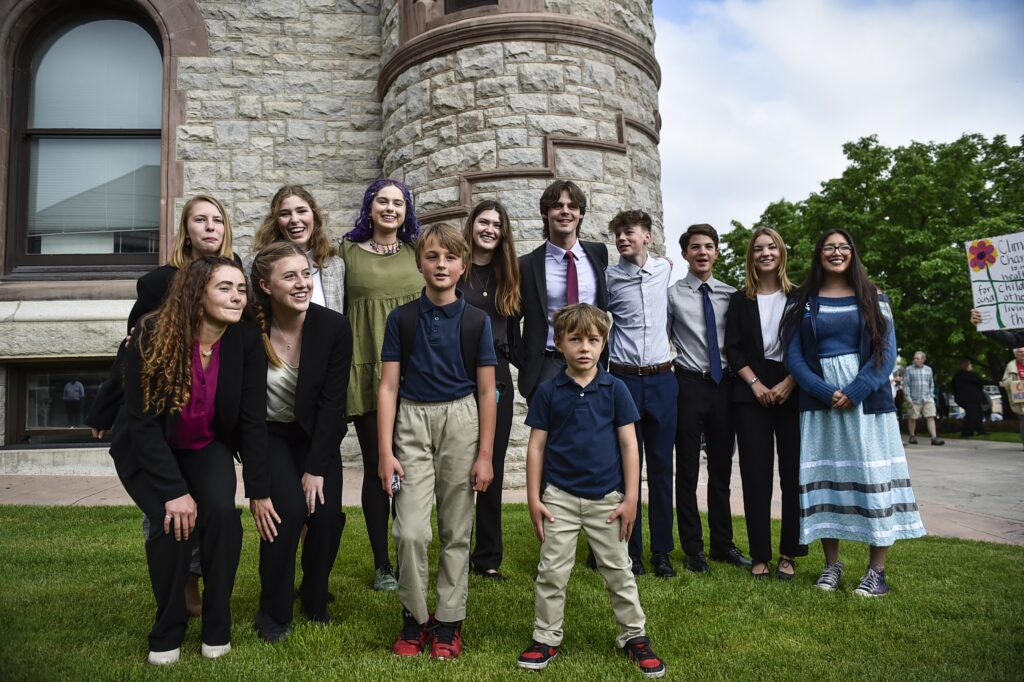
Montana Environmental Information Center co-director Anne Hedges said Montana’s legislative and executive branches are “running in the wrong direction to address the climate crisis” in the expert testimony she provided for the plaintiffs. Hedges said the only way the youth plaintiffs’ constitutional right to a “clean and healthful environment ” will be upheld is if the judicial branch intervenes to implement it.
The Held v. Montana trial before Lewis and Clark County District Court Judge Kathy Seeley has been described as historic. Through this lawsuit, the plaintiffs seek to hold the Montana government accountable for its energy-permitting policies. The 16 plaintiffs, who are between 5 and 22 years old, are arguing that their right to a “clean and healthful environment” has been violated. They are seeking a transition to a less carbon-intensive energy permitting framework by state agencies such as the Montana Department of Environmental Quality (DEQ).
Hedges pulled from her 30-year tenure reviewing, commenting upon and suing over proposed and permitted fossil fuel projects to provide insight on the state’s energy priorities and how they’ve evolved over the years.
Citing a 1968 environmental conference where the issue of increasing carbon dioxide emissions “could spell disaster” by increasing CO2 levels 50% in a 32-year period, Hedges said the state has known about the risks presented by greenhouse gas emissions for decades. She said although there have been promising developments in the past quarter-century, including former Gov. Brian Schweitzer’s 2000 appeal to the DEQ to create a plan to combat climate change and the 2017 Montana Climate Assessment conducted under former Gov. Steve Bullock’s tenure, the state Legislature has demonstrated hostility toward the clean energy transition and a willingness to do the fossil fuel industry’s bidding.
Asked if the state has ever denied a permit for a fossil fuel permit, Hedges replied “not to my knowledge.” She also noted that MEIC has asked DEQ to consider climate impacts in its Montana Environmental Policy Act (MEPA) analyses of power plants and coal mine expansions on multiple occasions. In several such cases, DEQ replied that it could not because such impacts were “regional, national or global in nature” — a reference to an amendment the Legislature made to MEPA in 2011 with greenhouse gas emissions in mind.
Hedges also discussed the 2023 Legislature’s repeal of the Montana Energy Policy, a 30-year old provision that was struck from statute this spring. The repeal of that policy resulted in the significant narrowing of the scope of the Held v. Montana trial per a May 23 order from Seeley. Hedges said she has not seen an appreciable shift in the state’s approach to energy permitting in the wake of the policy repeal.
During a short period of cross-examination, an attorney for the state asked if MEIC had ever asked the DEQ to initiate a rulemaking process for greenhouse gas emissions. Hedges replied that MEIC’s unsuccessful attempt to establish mercury pollution limits through such a process dissuaded them from lobbying a similar effort to curb greenhouse gas emissions.
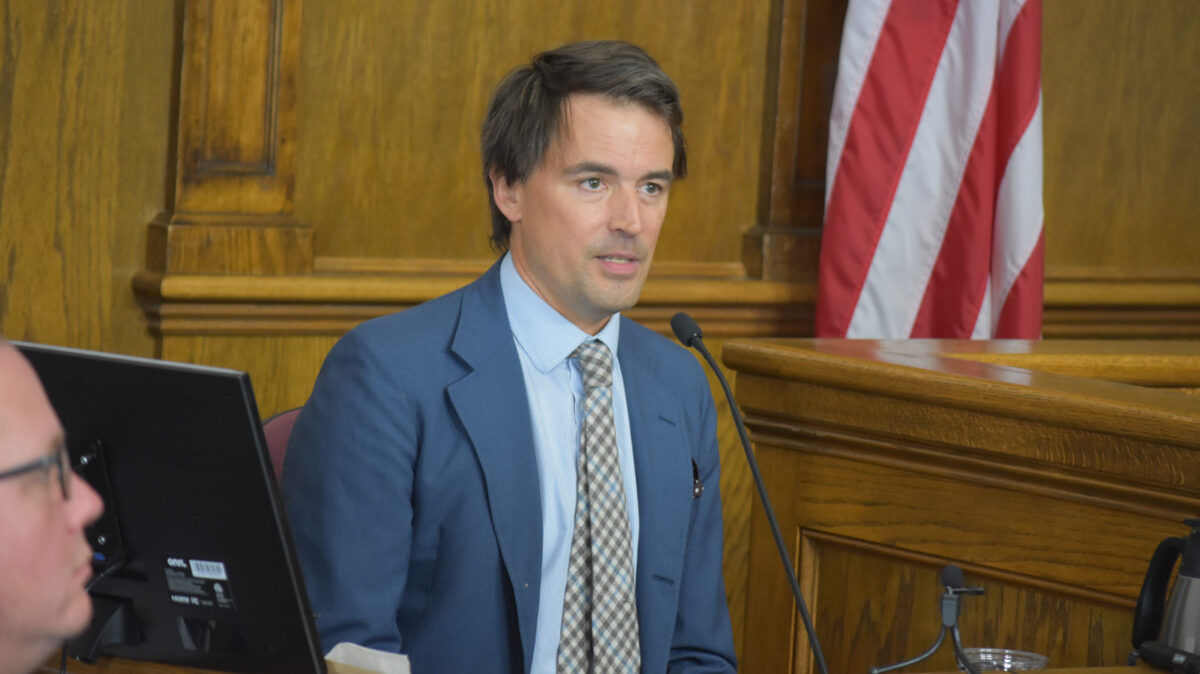
Seeley also heard testimony from Peter Erickson, a mathematically trained researcher with the Stockholm Environment Institute. Erickson was asked to calculate the state’s annual carbon dioxide emissions resulting from the extraction, transportation and combustion of fossil fuels.
The resulting figures are the sixth-highest, per capita, in the nation and exceed the emissions of more than 100 countries, Erickson said, adding that the state’s remaining supply of coal, oil and gas is substantial.
“Montana is only — quite literally — scratching the surface of the fossil fuels that … are still underground,” he said. Those reserves include the largest recoverable coal deposits in the United States, Erickson said, and 10 times more oil underground than what’s currently being pulled from the state’s approximately 4,000 oil wells.
According to Erickson, Montana’s 2019 emissions stemming from the extraction, transportation and combustion of fossil fuels comes out to 166 million tons. It’s roughly equivalent to the emissions of Argentina, which has 47 million people, and Pakistan with its population of 248 million people, Erickson said. Montana’s population is just north of 1.1 million.
“You can see, on a global scale, how emissions-intensive Montana’s economy is,” he said.
Asked to respond to the state’s assertion that Montana’s emissions are globally “minuscule,” Erickson said such assertions are “troubling.”
“Everybody has a responsibility to reduce emissions,” he said. “[That characterization] misrepresents the importance of Montana’s substantial carbon dioxide emissions and greenhouse gas emissions, and the cooperative nature of the effort to limit global warming.”
Seeley also heard from two of the plaintiffs during the June 15 trial proceedings:17-year-old Kian Tanner, of Bigfork, and 20-year-old Claire Vlases, of Bozeman.

Tanner described his connection to the Montana landscape through activities such as fly-fishing and skiing, and his love of his family’s 27-acre property near western Montana’s Swan Range. To a ripple of laughter, Tanner said fly-fishing is “along with arguing, my biggest connection to my dad” and “100% familial heritage.”
Tanner read from a piece he wrote for Hatch magazine when he was 13 years old titled, “Are there any adults in the room?” to inspire a greater sense of urgency among adults. He feels angry and disappointed by older generations’ lack of climate action, he said.
“It makes me feel sick, it makes me feel horrified that we aren’t doing what we can,” he said.
Vlases, a college student studying computer science and ethics, said between longer, smokier wildfire seasons and diminishing snowpacks, climate change has generated unwelcome physical, emotional and economic consequences.
Vlases has a history of engaging with environmental causes: when she was in seventh grade, she raised $125,000 to install solar panels on her middle school’s roof. Vlases said she’s dedicated to effecting change but feels that rather than supporting her in a transition to clean energy, her government is working against her.
Vlases’ parents were once told she would be lucky to walk, she said, but she’s become an avid runner who earns money in the winter by ski instructing at Big Sky Resort — an increasingly uncertain financial prospect, she said, as winter snowfall becomes less reliable. That’s one impact of climate change that was explored in the testimony earlier this week of renowned climate scientist Cathy Whitlock, who also described decreasing summer streamflows in her analyses of precipitation and temperature trends.
Vlases referenced the disability that she’s worked to heal through outdoor pursuits like skiing, biking, running and skiing in her testimony, choking up as she described the frustration she feels at the prospect of being unable to continue doing those activities as snowpacks shrink and increasing levels of wildfire smoke lead to unhealthy air quality.
Vlases said that while she doesn’t often resent the physical challenges she’s encountered, she does struggle to come to terms with the state’s promotion of policies that jeopardize the activities she does to maintain her physical strength.
“[It’s] like a knife stuck in my gut and twisted,” she said.
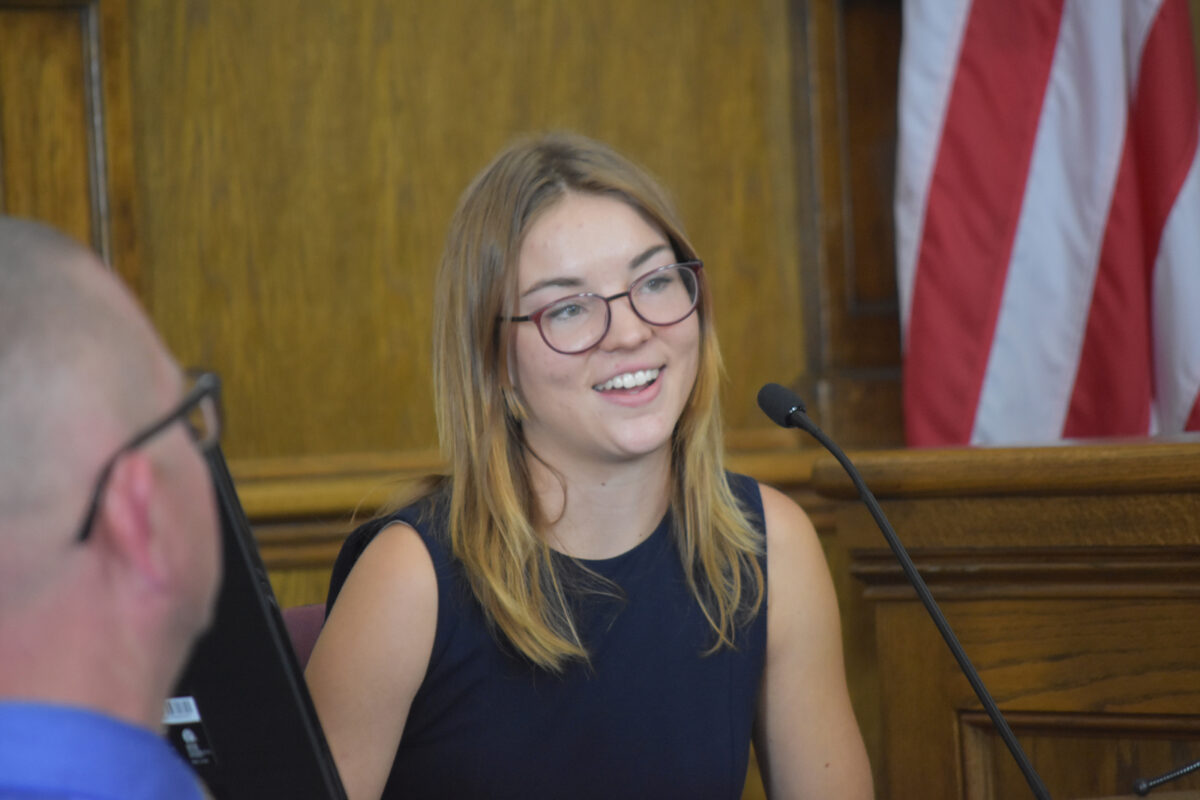
Asked to contemplate what a ruling in favor of her and her 15 co-plaintiffs would mean, Vlases said it would be an affirmation that “the Constitution was applied to the facts and our legal system works the way it’s supposed to.”
Tomorrow is the final day for the plaintiffs to lay out their case to Seeley before the state will have an opportunity to foreground its arguments in the lawsuit. Based on their opening arguments and briefs, Montana’s attorneys are expected to argue that the plaintiffs have no legal foundation to steer the state toward a different regulatory framework and that its emissions are negligible when considered on a global scale.
Tomorrow Seeley is expected to hear testimony from Lise Van Susteren, a psychiatrist and expert on climate change’s physical and mental health on youth; Mark Jacobson, director of the Atmosphere/Energy Program at Stanford University; and youth plaintiffs Lander Busse and Olivia Vesovich.
June 14 — Trial Day 3 Recap
Indigenous Experiences Headline Third Day of Held v. Montana Trial
Enrolled members of the Confederated Salish and Kootenai Tribes and Crow Tribe testified to the impact of climate change on their cultural heritage
HELENA — Sariel Sandoval, a member of the Bitterroot Salish, Upper Pend d’Oreille, and Diné Tribes and one of 16 youth plaintiffs suing the state of Montana over its contributions to climate change, testified on Wednesday that changes to Montana’s environment directly impact her Tribal identity.
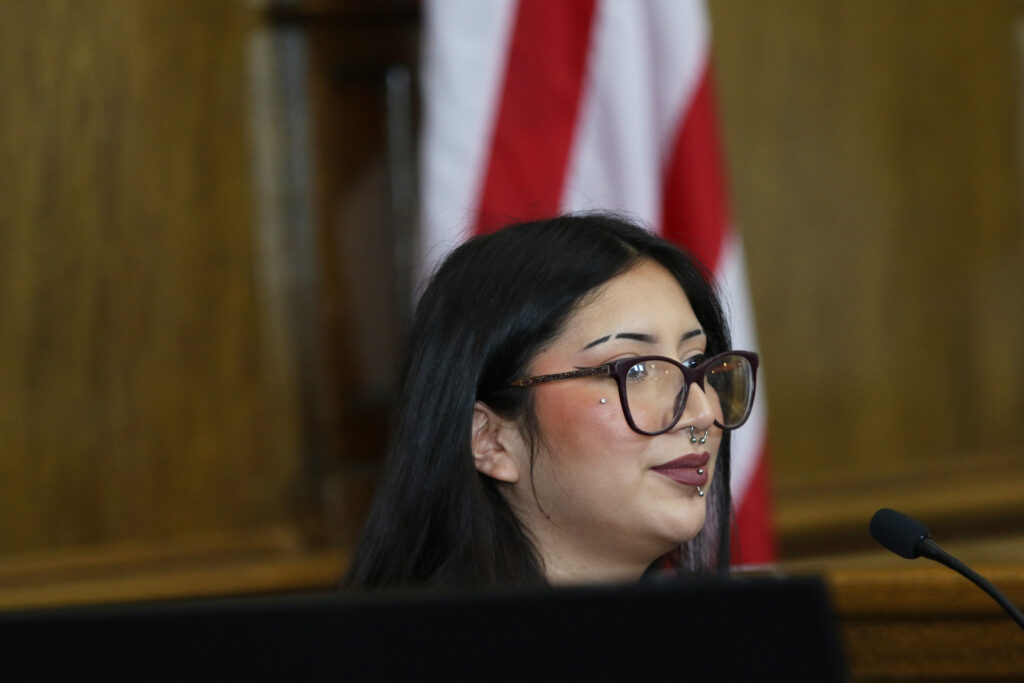
“The way we identify ourselves as Salish people, sqelixw, the root word translates to ‘flesh and land,’” Sandoval said. “That really shows the importance in our role as human beings and our connection to the land and the natural environment.”
Sandoval testified on the third day of the constitutional climate change lawsuit against the state of Montana in which the young plaintiffs allege government actions are violating their constitutional right to a clean and healthful environment.
Currently a student at the University of California, Berkeley, studying mathematics and Native American Studies, Sandoval said she “definitely” wants to return home after she graduates, to a community that has been essential to her life’s trajectory.
Quoting one of her Native American studies professors at Berkeley, Sandoval described Native communities as “post-apocalyptic communities.”
“They’ve lived through genocide, assimilation, relocation, termination and so many other traumas,” she said. “I believe we can definitely adapt and survive climate change, but that doesn’t make it right. We’ve done it before but that doesn’t mean we need a round two.”
Sandoval showed a lot of emotion from the stand as she spoke about the importance of oral storytelling in her community and her concerns about its role in the future. As an example, she said the Tribe’s Creation Stories, including Coyote Stories, can only be told when there is snow on the ground.
“The time that we can share those stories and explain to our youth who we are and our place in the world is becoming shorter,” she said. “One day we’re not going to have any snow on the ground. What happens to the stories?”
That’s a question that also concerns Michael Durglo Jr., the environmental director for the Confederated Salish and Kootenai Tribes (CSKT). Place names carry great significance to the Tribe, he said, imbued with stories that are passed down through the generations — such as Big Bull Trout Stream.
“If there’s no longer bull trout in that stream, does it still carry the name?” he asked the court. “Or do we then say, ‘that’s where the big bull trout used to be but they’re no longer there.’”
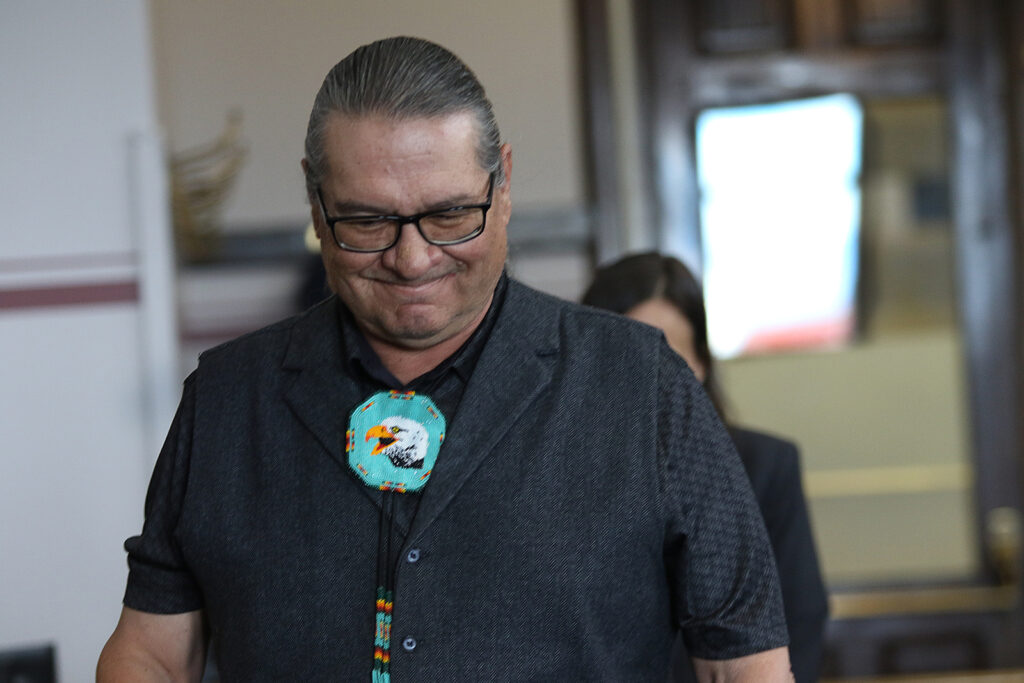
Durglo has spent decades working on climate change issues for the CSKT and nationally, earning accolades from the White House for his efforts. He served as a project leader for the CSKT 2016 Climate Change Adaptation Plan, one of the first tribal climate plans, and founded a youth education and action group, the Environmental Advocates for Global and Local Ecological Sustainability (EAGLES). His goal is for EAGLES to understand the necessity of taking action to preserve the environment immediately — an outlook he sees reflected in the youth plaintiffs.
“It’s absolutely necessary for our survival that we take action now. We can’t leave it to them,” he said, pointing to the defense table.
Attorneys for the state have continuously sought to paint Montana’s contribution to global emissions as minimal, and so far have kept cross examinations of expert witnesses short, while declining to question several youth plaintiffs at all.
Two of the youngest plaintiffs, Ruby and Lilian Doyle, are both enrolled members of Crow Tribe. Their father, Shane Doyle, testified on their behalf, describing some of the cultural traditions of the family, including attending Crow Fair every summer.
Crow Fair is the Tribe’s annual gathering in August that serves as a cultural celebration and reunion for extended families. It features a rodeo, traditional dances, parades, and namings, and is a favorite tradition of the girls, Doyle said. Both Ruby and Lilian take part in several traditional styles of dancing, but extreme weather in recent years has led the family to decide they shouldn’t take part in the rites.
“I don’t think there is anything honestly comparable in American society to what Crow kids experience at Crow Fair,” Doyle said. “It’s something that is just so unforgettable, it’s such an important part of your identity. If you miss out on that, that’s I think a dramatic loss.”
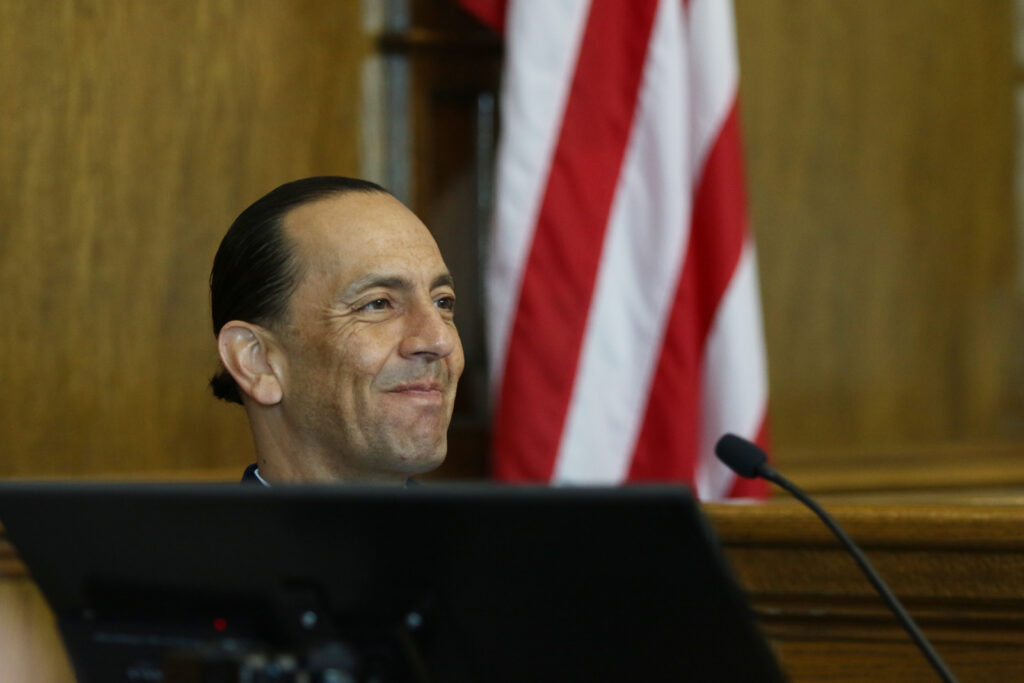
Doyle also testified to the cultural significance of the seasonal cycles of various plants. Crow Fair, for example, has taken place during the chokecherry harvest for the last 100 years. But a drought several years ago delayed the natural cycle — the Fair went forward without bountiful chokecherries, going against its traditional history. He added that all his kids, including Ruby and Lilian, are taught the importance of the natural world to their culture and their future.
“As part of the Crow Tribe we’re taught we have three mothers—your natural mother, your home and your earth. Taking care of those three things is your responsibility,” Doyle said. “So I think that joining this lawsuit was a natural part of that for them from their cultural perspective.”Additional plaintiff testimony on Wednesday came from Taleah Hernández, a Polson resident, and Georgianna Fischer, who lives in Bozeman.
Hernández talked about seeing recent wildfire scorch the nearby mountains, preventing her from going to work where she trains horses, costing her wages and bringing thick smoke to her hometown. “I feel like I’m losing hope. I wouldn’t want to see anybody under the threat of wildfire near their homes,” she said.
Fischer testified how her competitive Nordic skiing career has been impacted by climate change. In high school, Fischer qualified for the USSA Junior National Cross Country Skiing Championships four years in a row and currently competes for the University of New Hampshire. Partaking in a sport that relies on snowpack keeps Fischer regularly in tune with changes to the climate.
In 2021, at the annual West Yellowstone ski festival, which marks the first competitive opportunity for the region’s skiers every November, a lack of snow canceled the races. How late the season goes into the spring also depends on how much snow remains on the ground and, she said, Montana’s shoulder seasons have seen less and less snow.
During the off-season, Fischer said her level of training — by trail running and roller skiing — is often reduced by wildfire smoke, which is especially worrisome as she’s become increasingly competitive on the national level.
“The summer is really important to build a good base and get ready for competition season in the winter, so every hour of training really counts in my sport,” she said. “I see on the East Coast, many of those skiers have not experienced these effects and so they are better prepared for the ski season. It’s intimidating starting a ski season knowing that I haven’t fully prepared.”
To round out Wednesday’s witness list, attorneys for the plaintiffs presented testimony from Jack Stanford, an ecologist and the former longtime director of the Flathead Lake Biological Station, who told the court how Montana’s freshwater ecosystems are affected by the warming climate.
Each major freshwater arterial in the state has seen trends of decreasing streamflow, Stanford said, leading to increased water temperatures that impact thousands of species that rely on aquatic environments, including native trout populations.
In addition, Stanford shared streamflow and temperature data, as well as projections, all of which show peak stream flows are occurring earlier in the calendar year, increasing the likelihood of major flooding events. As an example, Stanford referenced last June’s Yellowstone River flood that destroyed the entrance road to Yellowstone National Park and has been called a “500-year flood event” by researchers.
“It seems like we’re getting hundred-year floods every 20 years or so these days,” Stanford said as a slide of the river flooding a nearby town was shown to the court. “These events are occurring more frequently today than in the past. And that’s the consequence of it in the picture there.”
The Held v. Montana trial will continue at 9 a.m. Thursday morning in Helena with testimony from Pete Erickson, Anne Hedges, and youth plaintiffs Kian Tanner and Claire V.
June 13 — Trial Day 2 Recap
‘Inspirational’ Landscape of Glacier National Park Emerges as Thread in Climate Trial
Testimony from renowned Earth scientist, glaciologist figures prominently into second day of youth-led constitutional climate trial Held v. Montana
HELENA — Attorneys representing 16 youth plaintiffs in a constitutional climate-change lawsuit against the state of Montana on Tuesday presented testimony from an internationally renowned Earth scientist and a retired glaciologist who for three decades studied the diminishing ice masses of Glacier National Park. Both witnesses described to a Helena courtroom how the state’s steady warming trend is transforming the landscape for future generations, including one of the young plaintiffs who grew up on Glacier’s doorstep.
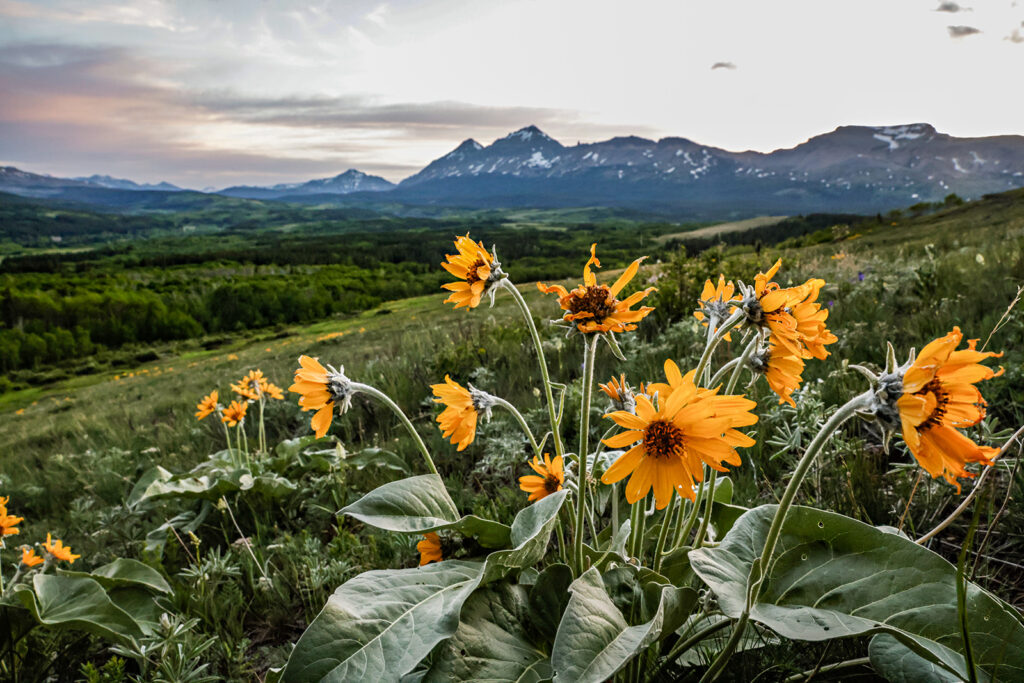
Much of the landmark environmental trial’s second full day of testimony centered on the connection between Montana’s warming climate and the harm alleged by the youth plaintiffs, who say their constitutional right to a “clean and healthful environment” has been violated by the state’s practice of promoting and permitting the fossil fuel industry, contributing to climate change through greenhouse gas emissions.
“The climate science is clear there’s an urgent problem,” said Cathy Whitlock, a Montana State University professor who studies environmental change over the course of millennia. Describing the increase of severe drought, major flood events and more frequent and intense wildfires, Whitlock warned “the harm will get worse.”
“Montana’s actions to promote the utilization and development of fossil fuels are inconsistent with the need to reduce emissions to stabilize the climate system,” Whitlock continued. “These ongoing actions can harm our children and future generations including the 16 youth plaintiffs. And they will be penalized as far into the future as we can imagine.”
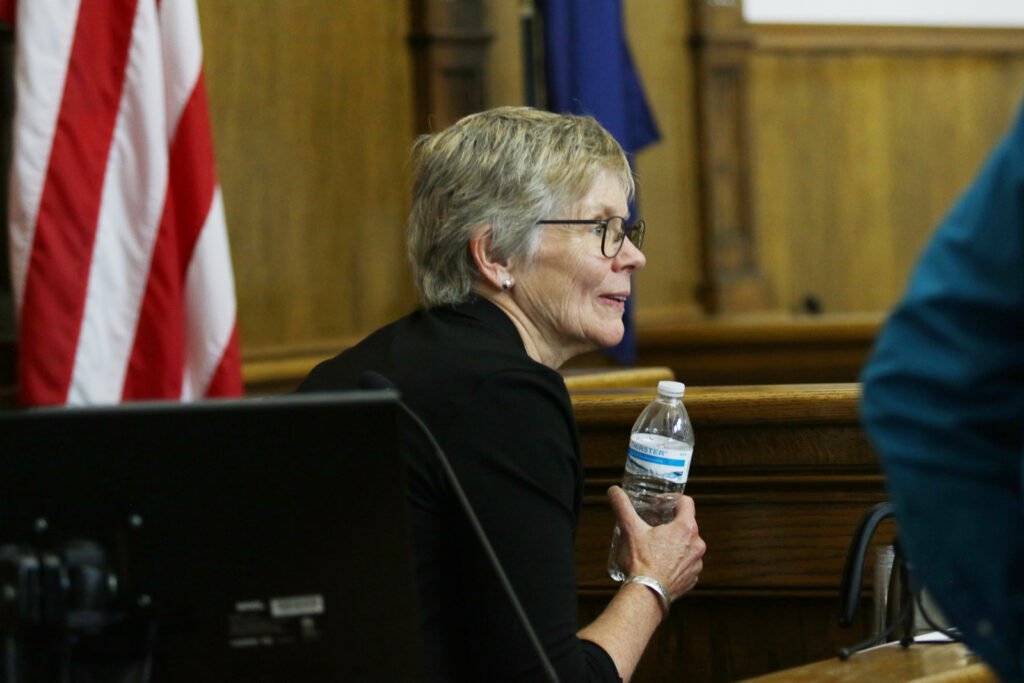
For retired U.S. Geological Survey (USGS) glaciologist Dan Fagre, learning about the penalties of the future meant looking at the past.
Describing Glacier’s pristine landscape as “inspirational,” Fagre was responsible for mapping the historic range of 146 of the park’s eponymous landforms. Today just 26 named glaciers remain in Glacier Park, and those are fractions of their former size.
“Glaciers are a physical manifestation of climate laying on the landscape,” Fagre said. “They just sit there and respond to temperature and precipitation.”
Following the adage that seeing is believing, Fagre shared exhibits from the USGS Repeat Photography Project, a series of historic photos taken during the late 1800s and early 1900s that researchers replicated from the same vantage points starting in 1997. Fagre led the program during his time with the USGS Northern Rocky Mountain Science Center in West Glacier, constructing side-by-side visual comparisons of the images to measure glacial recession.
Since the mid-19th century, the number of glaciers in the park has declined by 82%, Fagre said, and the total area of glacial ice has declined by 70%. The rate of melting has increased in recent decades, according to Fagre, with the existing glaciers losing nearly 1% of their area per year between 2005 and 2015.
“Clearly if we’d seen melting at that rate with the original glaciers starting in 1850, we would have lost them a long time ago,” he said, directly attributing the decline to human-caused greenhouse gas emissions. “There’s nothing else that would change the climate that quickly.”
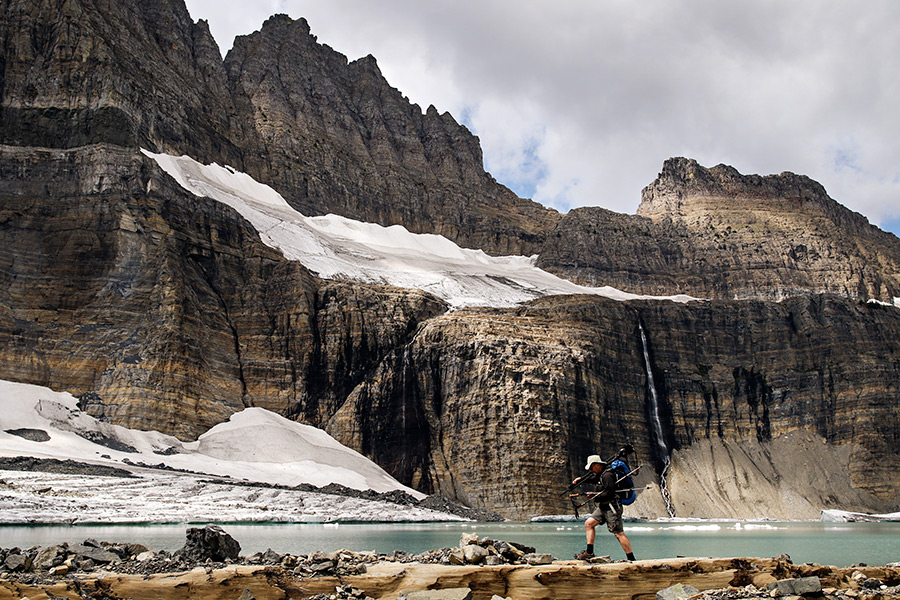
That didn’t sit well with two of the youth plaintiffs who testified Tuesday — Mica Kantor, 15, of Missoula, and Badge Busse, 15, of Kalispell.
Kantor was four years old when he first learned about climate change, he said, after he watched the 2012 documentary “Chasing Ice.” Throughout elementary and middle school, he took part in climate protests and rallies, including Fridays for Future, the global youth climate strike movement started by activist Greta Thunberg.
Kantor also described visiting Glacier National Park where his favorite animal, the pika, lives. Both the potential loss of pika habitat, and the decline in the park’s glaciers, added to his concerns over the future climate. Growing up, Kantor said he experienced the physical impact of climate change as wildfires frequently filled his hometown with smoke and limited his ability to go outside.
As an avid runner — Kantor has run a 5:05 mile and following the trial’s conclusion will take part in the Missoula Half Marathon — he worries about how smoke could damage his lungs and limit his ability to keep running, particularly in light of his asthma.
Kalispell’s Busse, whose brother is a co-plaintiff in the case, described his upbringing hunting and fishing in northwest Montana, and skiing at Whitefish Mountain Resort. He was even named after the nearby Badger-Two Medicine region southeast of Glacier National Park, a favorite area for himself and his dad to recreate in. Through the years, Busse said he’s noticed his favorite bird to hunt, Hungarian Partridges, have been more difficult to find, which he learned will become more common if as the animals relocate to a better climate.
In the winters, Busse spends his free days on the slopes and is a member of the local Freestyle Ski Team. He described his excitement to put on his skis the first day there’s enough snow but has noticed changes to snow conditions in recent winters, making him worry about the future of the sport.
“I would like my future children to be able to experience skiing the same way I do,” he said.

Wrapping up the day’s testimony was Dr. Lori Byron, a pediatrician in Crow Agency who testified to the young plaintiffs’ physical and mental health. Under direct examination by Phil Gregory, explained the physiological differences between kids and adults that make young people more susceptible environmental stressors such as extreme heat and increased pollution.
Children have higher respiratory rates, higher basal metabolic rates and sweat less than adults, Byron said, which means they take longer to acclimatize to extreme heat. She said during heat waves hospitals see an uptick in the number of children admitted.
In addition, the developing respiratory systems in children make them more susceptible to airborne particulates, such as those from wildfire smoke. Air pollution can absorb into the bloodstream from the lungs, she said, and research shows that can trigger or worsen leukemia, asthma and juvenile idiopathic arthritis, an autoimmune disease. Several of the young plaintiffs have asthma and Byron cited research showing the increased risks they face when dealing with poor air quality.
“Just as it behooves a smoker to quit smoking before they develop lung cancer, it behooves the state of Montana to take an interest in our future, reduce fossil fuels and begin with climate change mitigation on a serious level,” she said.
Representing the state in its defense, attorney Thane Johnson conducted the cross-examination of Whitlock with lines of questioning aimed at casting doubt on the myriad research studies Whitlock presented. Johnson pressed Whitlock on whether completely ceasing fossil fuels emissions in Montana, which the State has characterized as minuscule on the global scale, would have any immediate, measurable effect on the global climate. Whitlock repeatedly emphasized that every ton of CO2 emitted contributes to the destabilization of the climate, and Montana needs to do its part.
The Held v. Montana proceedings will continue Wednesday morning at 9 a.m. with continued testimony by Dr. Byron and additional witnesses Shane Doyle and Michael Durglo, and youth plaintiffs Sariel and Taleah.
June 13 — Trial Day 2 Mid-day Brief
Climate Expert: “The Harm Will Get Worse”
Scientific testimony figures prominently into second day of youth-led constitutional climate trial Held v. Montana
HELENA — Attorneys representing 16 youth plaintiffs in a constitutional climate-change lawsuit against the state of Montana on Tuesday morning presented testimony from Cathy Whitlock, an internationally renowned Earth scientist who told a Helena courtroom how the state’s steady temperature increase will affect future generations.

Introduced as an expert witness for the plaintiffs at the outset of the landmark trial’s second day, Whitlock drew a connection between Montana’s warming climate and the harm alleged by the youth plaintiffs, who say their constitutional right to a “clean and healthful environment” has been violated by the state’s practice of promoting and permitting the fossil fuel industry, contributing to climate change through greenhouse gas emissions.
“The climate science is clear there’s an urgent problem,” Whitlock said during the second day of proceedings before Lewis and Clark County District Court Judge Kathy Seeley, describing the increase of severe drought, major flood events and more frequent and intense wildfires, stating “the harm will get worse.”
“Montana’s actions to promote the utilization and development of fossil fuels are inconsistent with the need to reduce emissions to stabilize the climate system,” Whitlock continued. “These ongoing actions can harm our children and future generations including the 16 youth plaintiffs. And they will be penalized as far into the future as we can imagine.”
The bench trial for the Held v. Montana case opened yesterday with testimony from three of the 16 youth plaintiffs bringing the lawsuit, as well as two expert witnesses.
In Whitlock’s testimony on Tuesday, she outlined Montana’s historical climate trends and cited projections for the future under scenarios in which there is no mitigation of greenhouse gases emissions, a known contributing factor to global warming.
“Montana is getting warmer, and the rate of warming is increasing,” Whitlock said during direct examination by plaintiffs’ attorney Phil Gregory.
Citing the 2017 Montana Climate Assessment she co-authored, Whitlock stated that temperatures in the state have been trending upwards by roughly 0.2 degrees Fahrenheit per decade since 1900, but in recent decades that rate has increased to close to 0.5 degrees Fahrenheit per decade in some regions of the state. Whitlock said Montana’s warming rate exceeds the national average due to the state’s high elevation, northern latitude and distance from the ocean. Under the most extreme projections of global carbon dioxide (CO2) concentrations, regions of Montana could see the number of days above 90 degrees Fahrenheit increase by up to 50 days, she said, drawing a distinction between weather patterns and climate trends.
“Weather determines what you reach for in your closet and what you wear that day,” Whitlock said. “Climate on the other hand is the average of weather… if you think of what you wear as the weather, the climate is all the clothes in your closet.”
Whitlock also testified to Montana’s declining snowpack in recent decades, as well as changing precipitation trends. While data shows the annual precipitation levels in the state haven’t significantly varied over the decades, the type and timing have, she said, with drier winters and summers and wetter springs and falls.
The combination of declining snowpack and drier summers can lead to widespread drought and more intense wildfire seasons, a combination Whitlock said Montana experienced in 2017 when fires burned 4.8 million acres of land and led to $2.6 billion in agricultural losses.
While Whitlock admitted there were some upsides to a warming climate, including a longer growing season and better conditions for certain crops such as cantaloupe, she believes the negatives far outweigh the positives.
Representing the state in its defense, attorney Thane Johnson conducted the cross-examination of Whitlock with a line of questioning aimed at casting doubt on the myriad research studies Whitlock presented.
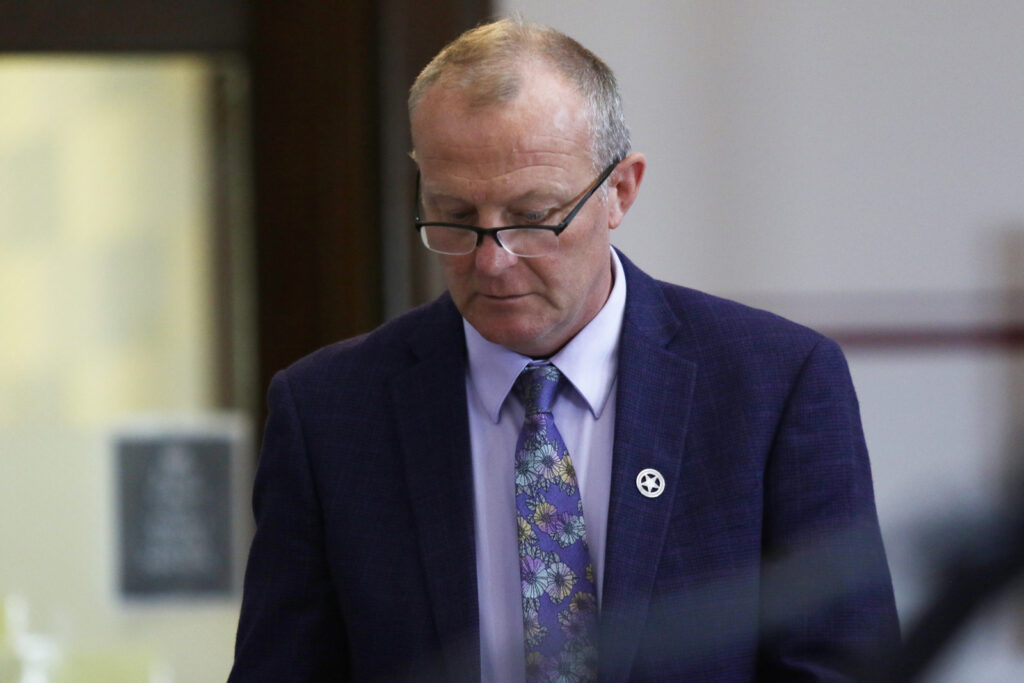
During the cross-examination, Johnson pushed back against annual measurements of snowpack in Montana, taken on April 1 each year, as not being indicative of annual snowfall. He added that such data, which Whitlock said indicated signs of drought in northwest Montana this spring, also doesn’t account for snowfall later in the season.
In a line of questioning about Montana’s energy transition, Johnson asked Whitlock whether the state had the capacity to power its transportation grid with renewable energy, including whether it could meet the energy demands of agricultural equipment in rural areas.
While admitting she was not an expert on energy transition, Whitlock said the state’s current energy portfolio and infrastructure should not limit a statewide pivot away from greenhouse gas emissions.
“I think this is a very exciting time to be living in because there’s so much change going on across Montana and the country,” she said.
Throughout questioning, Whitlock repeatedly emphasized that every ton of CO2 emitted contributes to the destabilization of the climate, and Montana needs to do its part.
“The only solution is swift decarbonization of our energy system and immediate efforts to protect our hydrosphere and biosphere,” she said. “Dr. Running and I have been warning against the dangers posed by climate change and fossil fuels for decades and yet Montana continues to aggressively pursue an expansion of fossil fuel utilization and production. There’s little time remaining to avoid locking us into irreversible climate impacts.”
June 12 — Trial Day 1 Recap
Montana Youth Take Climate Change Case to Court
On first day of Montana climate trial, youth plaintiffs testify to hardships of growing up in a warming world as scientists describe scope of crisis
HELENA — The opening day of Montana’s youth-led constitutional climate trial featured tearful testimony from the lead plaintiff, Rikki Held, whose firsthand account of how drought, flood and fires shaped her upbringing on the family’s ranch in Broadus gets at the heart of a landmark environmental lawsuit against the state.
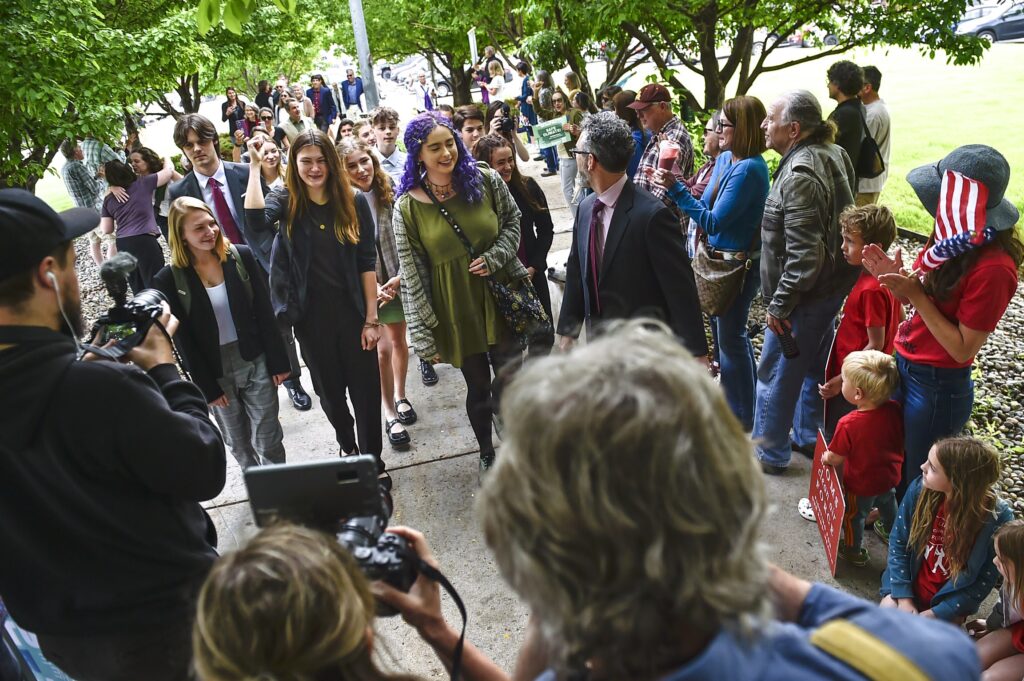
Arguing that Montana’s government is dutybound to protect its citizens from the devastating effects of climate change, which it cannot do while also supporting the fossil fuel industry, attorneys representing 16 youth plaintiffs from across Montana outlined their case in broad strokes on Monday, the first day of a proceeding slated to unfold over the next two weeks in Lewis and Clark County District Court in Helena.
While many of the young plaintiffs named in the lawsuit are expected to offer testimony during the potentially landmark environmental bench trial before Judge Kathy Seeley, the curtain-lifter went to Held, who told her version of how the state has violated her constitutional right to “a clean and healthful environment.”
Held said she grew up on a ranch near Broadus, Mont., where the effects of climate change on her ranch included extreme drought, flood events and wildland fires that affected her family’s livelihood. During a particularly catastrophic wildfire season, Held said 70 miles of powerlines were destroyed and her family’s property was left without electricity for a month, which led to the death of several cattle.
“I remember … ash falling from the sky, people from town being evacuated,” she said, choking up with emotion on the witness stand. “It impacts the wellbeing of myself, my family, my community … I see the impacts, I know the science behind it. It’s stressful to see that.”
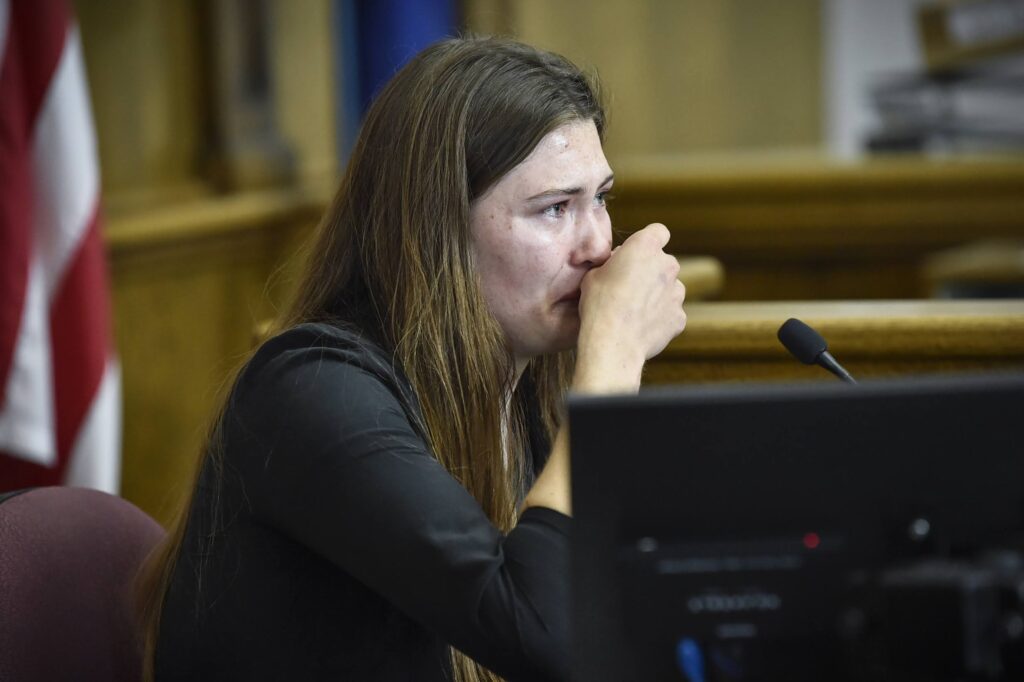
Held’s testimony followed opening statements as attorneys on both sides established the legal framework for a case that will rest heavily on expert witness testimony as well as that of the youth plaintiffs, and on the constitutional bedrock on which it was engineered. For the plaintiffs, Roger Sullivan introduced the scientific and constitutional experts who will testify but also spent considerable time describing the harm he alleges plaintiffs have suffered due to the state’s unwillingness to mitigate Montana’s contributions to climate change.
Assistant Attorney General Michael Russell didn’t address the question of whether the state or any of its executives has a legal obligation to gird against the causes of climate change, but argued they have no control over greenhouse gas emissions he characterized as “minuscule.” Instead, he said the case amounts to a procedural question about a law that no longer exists — a reference to a bill passed by the Legislature last month rewriting a section of law at the heart of the case.
“This case as it currently exists is far more boring than the plaintiffs would make it out to be,” Russell told the court. “It’s simply a challenge to a discreet provision to a purely procedural statute.”
In its current scope, the case focuses on a provision in the Montana Environmental Policy Act (MEPA) that prohibits state agencies from considering greenhouse gas emissions and climate change impacts while conducting environmental reviews. The lawsuit is the first youth-led lawsuit focused on climate change impacts to reach trial and could provide legal guidelines for similar lawsuits set to go to trial later this year.
Despite recent efforts by the defense to dismiss the case, including an 11th-hour appeal last week to the state Supreme Court, the Held trial opened this morning with a courtroom filled with the plaintiffs and their families, as well as members of the public and dozens of reporters in attendance.
In addition to testimony from Held, the court heard from Mae Nan Ellingson, a delegate to the 1972 Constitutional Convention responsible for including the provision guaranteeing a citizen’s right to a clean and healthful environment.
Ellingson was the youngest delegate to the 1972 convention that rewrote Montana’s constitution. She was the coauthor of the document’s preamble, as well as one of the strongest advocates of articulating a right to a “clean and healthful environment.”
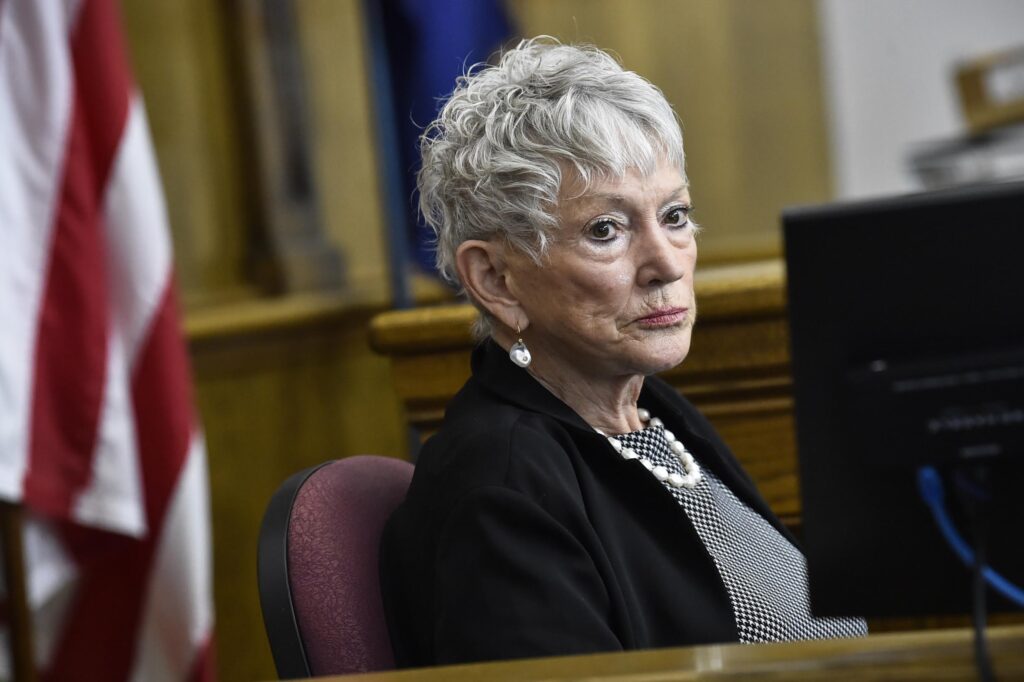
In her testimony, Ellingson described being amazed by the beauty of Montana’s Glacier National Park on her honeymoon, and how it prompted her to move to Missoula to attend the University of Montana in the1960s.
Back then, Ellingson said the air quality in town was so bad that she couldn’t see Mount Sentinel, the iconic prominence that looms over the campus. She began phoning in reports to the local radio station and joined the group Gals Against Smog and Pollution (GASP), signaling her entrée to environmental activism.
Those early experiences, she said, fomented Ellingson’s desire to enshrine environmental protections in the Constitution, which are reflected in the document’s preamble.
“I’m proud of this constitution, I’m particularly proud of the right to a clean and healthful environment and our veery strong bill of rights,” Ellingson told the court. “I support and encourage the young people of our state to be involved in our state.”
Following an afternoon recess, plaintiffs’ attorneys called on Dr. Steven Running, a University of Montana professor emeritus, former NASA scientist and contributor to the United Nations’ Intergovernmental Panel on Climate Change, which was awarded the 2007 Nobel Peace Prize for its work assessing the science of climate change.
Running’s examination by attorney Phil Gregory included a comprehensive overview of climate science stretching back to the late 1800s. The overwhelming scientific consensus through the years, Running said, was that the concentration of carbon dioxide (CO2) in the atmosphere has been exponentially increasing, leading to a warmer climate and greater extreme weather events such as heat waves, floods and wildfires.
“As long as we keep emitting fossil fuels, it will keep getting worse,” Running told the court. “I think Montana, and really anywhere else, needs to stop burning fossil fuels. It’s really quite straight forward.”
The atmospheric concentration of carbon dioxide reached 424 parts per million (ppm), according to a report by the National Oceanic and Atmospheric Administration (NOAA) released last week, which Running cited as one of the largest increases in CO2 levels on record.
“It took 200 million years for the world to generate the fossil fuels — oil, coal gas — and we are digging them up and burning them in 200 years,” Running told the court. “If we don’t stabilize this, it’s hard to know where the planet will be in another century.”
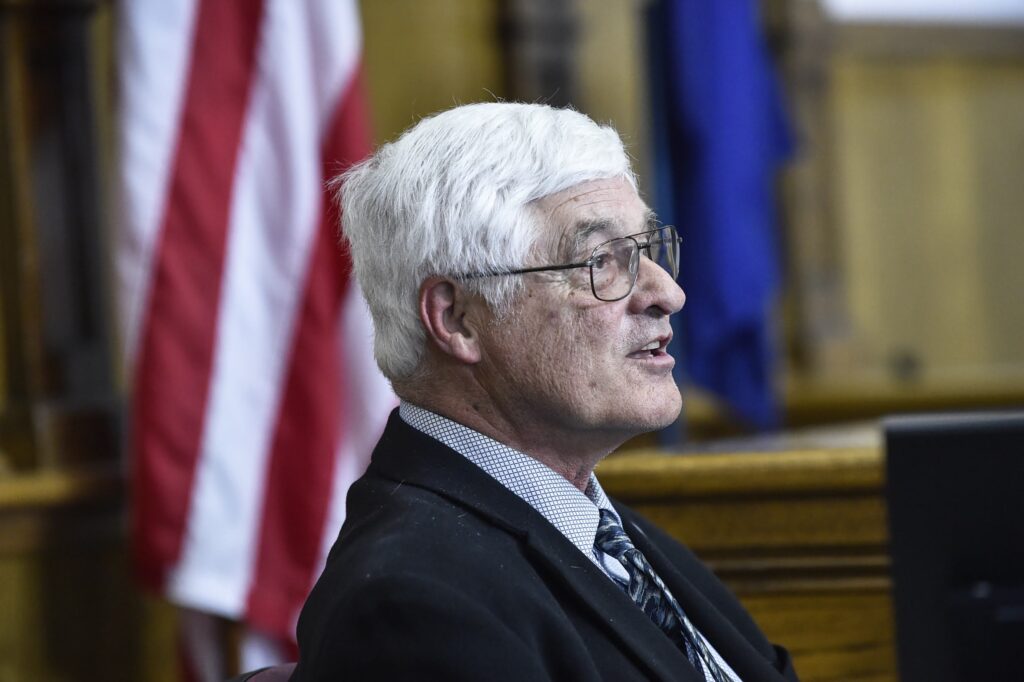
While the science often got “thick” as Running distilled decades’ worth of research into two hours of testimony, he explained to the courtroom how the greenhouse effect traps heat within the atmosphere, increasing both surface temperatures and, to a greater extent, oceanic temperatures. The excess energy trapped within the atmosphere is roughly 360 zetta joules, which Running described as the amount of energy needed to boil off Flathead Lake, the largest freshwater lake west of the Mississippi, 40,000 times over.
At times, attorneys for the defense attempted to exclude portions of Running’s testimony, including referencing the latest IPCC assessment report, and, in a moment of courtroom levity, a paper showing how snowshoe hares’ are affected by changing seasons — the objection that Running was not introduced as an expert in wildlife biology was overruled by Judge Seeley, as Running coauthored the paper.
On cross examination, Mark Stermitz, an attorney for the state, argued that Montana’s carbon dioxide emissions, on a global scale, are not significant enough to make an impact.
Running agreed, though he added that not emitting a ton of CO2 in Montana was just as impactful as not emitting a ton of CO2 anywhere else in the world — and that every action is necessary to restabilize the climate.
“What is been shown in history over and over and over again, is when a significant social movement is needed, it often is started by one or two or three people,” Running responded. “If our state decided to do that, do what you’re hypothesizing, we can’t tell how many other states would decide that’s the right thing to do … The US likes to claim that we’re a leader and this is a kind of issue that maybe we should show some leadership.”
Following Running’s testimony, two young plaintiffs took the stand.
Grace Gibson-Snyder, 19, grew up in Missoula and is currently a student at Yale University. She spoke about her early brushes with environmental activism in high school, including starting a project to reduce single-use plastic in her hometown and joining a service club called Students Against Violating the Environment.
“I think I grew up with climate change as part of my vocabulary,” she said. “I think a lot of my generation has.”
Throughout high school, Gibson-Snyder said she experienced climate change impacts when wildfire smoke obscured the Missoula valley and canceled her high school soccer, as well as during visits to Glacier National Park where she described standing next to the melting Sexton Glacier.
“It was devastating to watch this thing that’s so unique, so special to Montana, so powerful to be next to and know I was watching it go away,” she said.
Outside of the physical manifestations of climate change, Gibson-Snyder said she experiences emotional turmoil about the future — guilt about not doing enough as an individual, uncertainty about whether having her own kids would be moral or ethical given the world’s trajectory, and frustration that the government wasn’t stepping in.
“When [the government] is actively making choices that are shown to harm the people on hand, that’s a betrayal of the people and it’s undermining the role of government,” Gibson-Snyder said. “It is something that needs to be changed.”
The first day of the landmark climate change trial ended with testimony by a third plaintiff, 17-year-old Eva L., who lives in Livingston.
Eva grew up around the Yellowstone River, rafting it each summer and driving across it almost daily with her family to get into town. Last summer, the river flooded, washing out nearby bridges and flooding homes and business from Livingston all the way south to Yellowstone National Park, where the main road into the nation’s first national park was damaged.
Eva described feeling “threatened and attacked” when she saw the destruction wrought by the flood, even as she went to work filling sandbags to keep the water back and taking part in the cleanup efforts when the waters receded.
Asked about what prompted her inclusion as a plaintiff, Eva responded that she felt it was her only option to act.
“I couldn’t vote, I still can’t vote, so doing this is a way of getting my voice out there to be heard,” she said. If the plaintiffs win, she added that “it would be like a light at the end of the tunnel, and just give me a sense that we’re working in the right direction.”
The Held trial resumes Tuesday morning and is expected to last for two weeks.
June 12 — Trial Day 1 Mid-day Brief
Constitutional Climate Change Trial Opens in Helena
Attorneys in Held v. State of Montana delivered opening statements before judge Kathy Seeley, kicking off the nation’s first youth-led climate change trial
HELENA — Attorneys in the youth-led constitutional climate change lawsuit Held v. Montana on Monday delivered opening statements in a crowded Helena courtroom where the landmark environmental trial is set to unfold over the next two weeks.
Lewis and Clark District Court Judge Kathy Seeley is presiding over a bench trial in the high-profile lawsuit brought by 16 youth plaintiffs from across Montana who say the state has violated their constitutional right to a clean and healthful environment. The trial is focused on a provision in the Montana Environmental Policy Act (MEPA) that prohibits state agencies from considering greenhouse gas emissions and climate change impacts while conducting environmental reviews. The lawsuit is the first youth-led lawsuit focused on climate change impacts to reach trial.
Despite recent efforts by the defense to dismiss the case, including an 11th-hour appeal last week to the state Supreme Court, the Held trial opened this morning with a courtroom filled with the plaintiffs and their families, as well as members of the public and dozens of reporters in attendance.
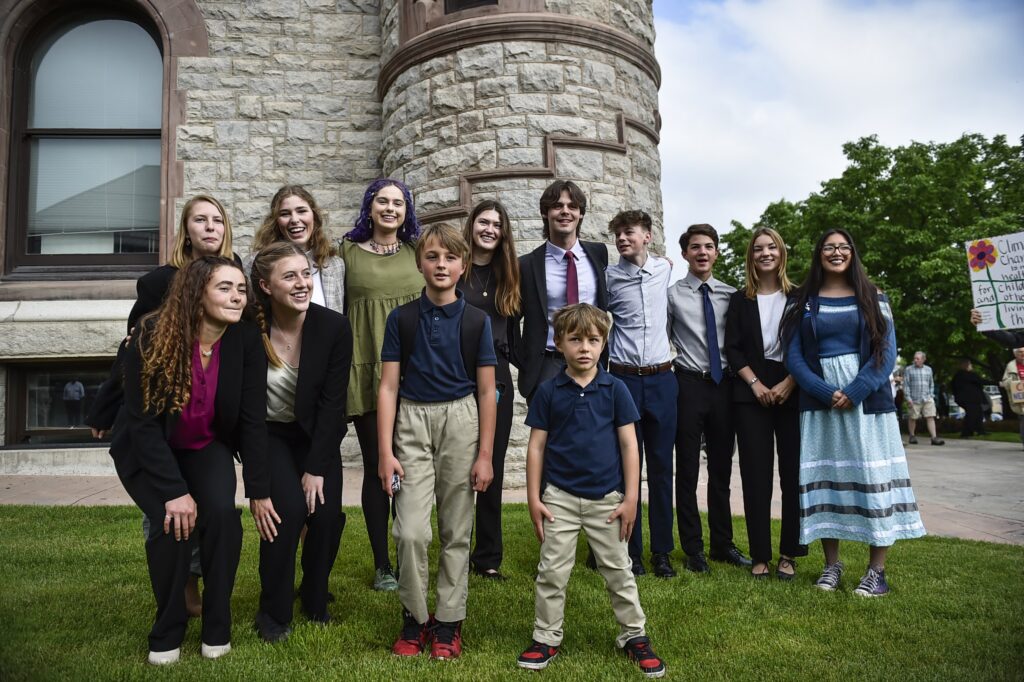
In opening statements, attorneys from both sides established the legal framework for a case that will rest heavily on expert witness testimony as well as that of the youth plaintiffs. For the plaintiffs, Roger Sullivan gave an overview of the case and introduced the environmental experts who will testify, while also describing the harm he alleges plaintiffs have suffered due to the state’s unwillingness to mitigate Montana’s contributions to climate change. By contrast, Assistant Attorney General Michael Russell succinctly stated that the trial is merely a legal question about a law that no longer exists — a reference to provisions of the state’s energy policy promoting the use of fossil fuels, but which the state Legislature repealed in April.
“This case as it currently exists is far more boring than the plaintiffs would make it out to be,” Russell told the court. “It’s simply a challenge to a discreet provision to a purely procedural statute.”
Following opening statements, the court heard from two witnesses — Mae Nan Ellingson, a delegate to the 1972 Constitutional Convention responsible for including the provision guaranteeing a citizen’s right to a clean and healthful environment, and the lead plaintiff Rikki Held.
Ellingson was the youngest delegate to the 1972 convention that rewrote Montana’s constitution. She was the coauthor of the document’s preamble, as well as one of the strongest advocates of articulating a right to a “clean and healthful environment.”
In her testimony, Ellingson described being amazed by the beauty of Montana’s Glacier National Park on her honeymoon, and how it prompted her to move to Missoula to attend the University of Montana in the1960s.
Back then, Ellingson said the air quality in town was so bad that she couldn’t see Mount Sentinel, the iconic prominence that looms over the campus. She began phoning in reports to the local radio station and joined the group Gals Against Smog and Pollution (GASP), signaling her entrée to environmental activism.

Those early experiences, she said, fomented Ellingson’s desire to enshrine environmental protections in the Constitution, which are reflected in the document’s preamble.
“I’m proud of this constitution, I’m particularly proud of the right to a clean and healthful environment and our veery strong bill of rights,” Ellingson told the court. “I support and encourage the young people of our state to be involved in our state.”
Many of the young plaintiffs are expected to offer testimony during the trial, including Held, who was the first to speak about the basis of her inclusion in this case.
Held grew up on a ranch near Broadus, Mont., and had early exposure to both scientific rigor and the impacts of climate change that ultimately led to her inclusion in this suit.
Before she entered high school, Held assisted in a U.S. Geological Survey (USGS) research project surveying cross sections of Montana’s Powder River, one of the longest undammed waterways in the West, which happens to pass through her family property. That research experience, along with learning about climate change in school, led Held to study environmental science at Colorado College, where she graduated with her bachelor’s degree just a few weeks ago.

Held also spoke about seeing the effects of climate change on her ranch including extreme drought, flood events and wildfires, and how the family’s business was affected.
During a particularly catastrophic wildfire season, Held said 70 miles of powerlines were destroyed and her family’s property was left without electricity for a month, which led to the death of several cattle.
“I remember … ash falling from the sky, people from town being evacuated,” she said, choking up on the stand. “It impacts the wellbeing of myself, my family, my community … I see the impacts, I know the science behind it. It’s stressful to see that.”
This afternoon the court will hear testimony from Dr. Steven Running, a climate science researcher.
June 6
Montana Supreme Court Rejects Attempt to Dismiss Climate Lawsuit
In a Tuesday filing the Montana Supreme Court rejected a petition by Attorney General Austin Knudsen to stop Held v. Montana, set begin trial on Monday
The Montana Supreme Court on Tuesday denied a request by Montana Attorney General Austin Knudsen to dismiss the constitutional climate change lawsuit, Held v. Montana, a week before the trial is due to start in Helena. The court cited a lack of evidence that new laws fundamentally changed the lawsuit’s complaints and stated no desire to alter the current trial schedule.
The lawsuit, filed in 2020, was brought by 16 youth plaintiffs who allege that Montana, through its executive agencies, has knowingly approved projects and implemented policies that support a fossil-fuel based energy system that adds dangerous levels of greenhouse gas pollution to the atmosphere, contributing to climate change, damaging Montana’s environment and harming the state’s youth.
Knudsen’s last-minute petition, called a writ of supervisory control, was filed on Monday, asking the state’s highest court to prevent the lawsuit from going to trial. The ask came on the heels of a separate legal motion to dismiss the landmark case on similar grounds — both cite a recent legislative revision to the Montana Environmental Policy Act (MEPA), which the state’s top legal official says topples a critical pillar upon which the climate case rests.
The end-of-session bill that targeted the case’s legal foundation is House Bill 971, which struck down a broad MEPA provision barring state agencies from reviewing “actual or potential impacts beyond Montana’s borders” and replaced it with a ban on evaluating any “greenhouse gas emissions and corresponding impacts to the climate.”
However, the state Supreme Court denied to take up the issue, writing that the state had not demonstrated how the amended language altered the plaintiffs’ complaint.
“Since the Complaint was filed, the theory of this claim has been that prohibiting consideration of the impacts of climate change in environmental review violates the Montana Constitution,” according to the court filing. “The State has provided no reason why the District Court’s ruling cannot be reviewed on appeal, if necessary … Moreover, trial, with preparation literally years in the making, is set to commence less than a week from now; we are not inclined to disturb the District Court’s schedule at this juncture.”
The lone dissent came from Justice Jim Rice, who would order a response and postpone trial, according to the order.
Lewis and Clark County District Judge Kathy Seeley will preside over the bench trial in Helena.
—Micah Drew
June 5
Montana Attorney General Asks State Supreme Court to Dismiss Climate Case
One week from the start of the first-ever constitutional climate-change trial, the state of Montana filed a petition to have the case thrown out
Montana Attorney General Austin Knudsen on Monday filed an emergency petition asking the state Supreme Court to vacate the trial date of a youth-led constitutional climate change lawsuit slated to begin next week.
The petition, called a writ of supervisory control, comes on the heels of a separate legal motion to dismiss the landmark case on similar grounds — both cite a recent legislative revision to the Montana Environmental Policy Act (MEPA), which the state’s top legal official says topples a critical pillar upon which the climate case rests.
The end-of-session bill that targeted the case’s legal foundation is House Bill 971, which struck down a broad MEPA provision barring state agencies from reviewing “actual or potential impacts beyond Montana’s borders” and replaced it with a ban on evaluating any “greenhouse gas emissions and corresponding impacts to the climate.” The bill was signed by Gov. Greg on May 10.
The lawsuit at the center of the legal wrangling was filed in 2020 on behalf of 16 youth plaintiffs who allege Montana’s fossil-fuel dominated energy economy violates their constitutional right to a clean and healthful environment. The case, Held v. Montana, is scheduled for a two-week trial set to begin June 12 in Helena.
Knudsen argues that the new MEPA language renders the lawsuit’s merits moot, and that it shouldn’t be allowed to proceed based on a law that no longer exists. The petition also states that, if the plaintiffs are allowed to amend their complaint to include the MEPA revision, the trial should be delayed to allow for further discovery.
During a pretrial oral argument on May 12, Lewis and Clark County District Judge Kathy Seeley told attorneys for both sides that she did not consider the changes to MEPA to be “nearly as substantive” as the state.
“It seems to me the preparation you have all done would be applicable to this statute as amended,” she said, reaffirming her intent to go to trial. “I’m not intending to stop everything to spend months wrapped around that spoke.”
In Knudsen’s petition, he also states that, because MEPA is not a regulatory statute, declaring any portion of it as unconstitutional will have no impact on the state’s ability to regulate greenhouse gas emissions, and the court is unable to offer the plaintiffs any relief.
Knudsen was previously successful in having a portion of the Held lawsuit dismissed based on the state’s energy policy, which the Legislature repealed earlier this year.
“Following the legislative session, there are no existing laws or policies for the district court to rule on. A show trial on laws that do not exist, as the district court seems intent on holding, would be a colossal waste of taxpayer resources,” Emily Flower, spokesperson for Knudsen, said in a statement to the Beacon. “This same lawsuit has been thrown out of federal court and courts in a dozen other states – and it should be dismissed here in Montana as well.”
Just last week, a federal judge ruled that Juliana v. United States, a case brought by Oregon-based youth plaintiffs on similar legal grounds, can amend their complaint and go to trial. A previous trial was halted by the U.S. Supreme Court days before it was set to begin in 2018. A similar case brought against Hawaii’s Department of Transportation has also been allowed to proceed to trial later this year.
— Micah Drew